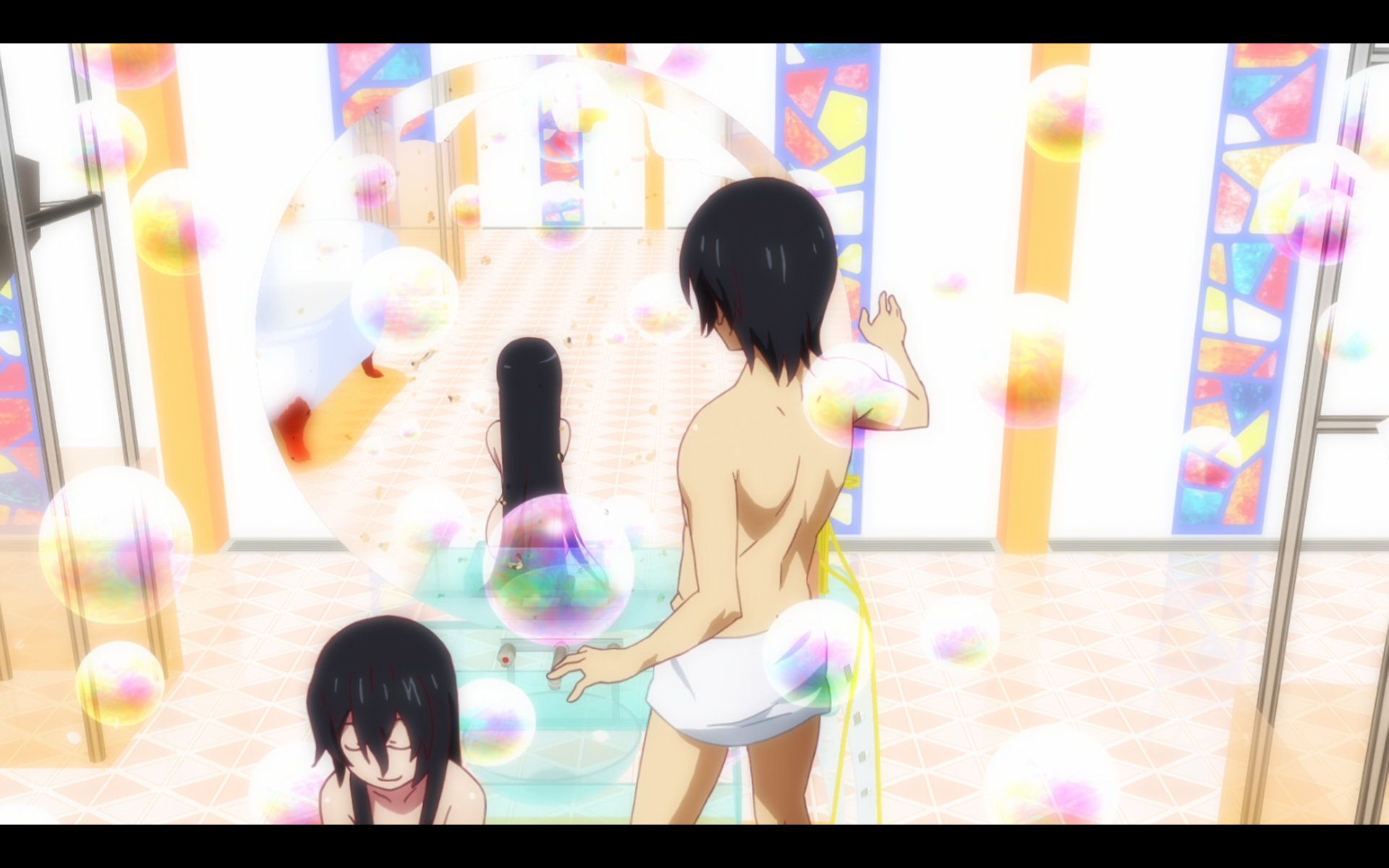
If you're at all familiar with the style of light novels popular before the isekai boom, the original Bakemonogatari series is not all that hard to pick the meaning out of. The biggest misconception I see is that the Monogatari series is at any point a harem show. If you're paying the slightest bit of attention Araragi and Senjougahara are committed from arc 1, and definitely cement that by the end of the season. I could gush about the stargazing scene forever. It's so beautiful and perfect. I feel the same way about that scene as Araragi does Senjougahara. I love everything about it. There's nothing I don't like about it. And I could say the same thing about Bakemonogatari as a whole; there's nothing I don't like about it.

The only way it gets better is by continuing. The Kizumonogatari film trilogy are a goddamn tour de force, bringing the already-odd visual style of the heavily budget-restricted TV series into the uncanny focus of memory. Everything catches the light like a thousand traced rays. No, I don't understand how it works at all. Everything is beautiful, and everything hurts. It is the story of a spring break vampire attack which left its victim scarred, so it makes sense the memory should be so deeply, richly vivid. It's a story of a trauma from and of something beyond human, so it makes sense to look like nothing else. And it's a wistful memory to the whole series, by the end of the end. All in all I think the jarring sweet-detail when compared to the rest of the series is, tentatively, earned. At the very least it shallowly makes for good desktop wallpapers.
Even more hauntingly gorgeous than the visuals is the dialogue. Fully gonna level and just say, this ending scene has been biting chunks out of me for almost a month at this point:
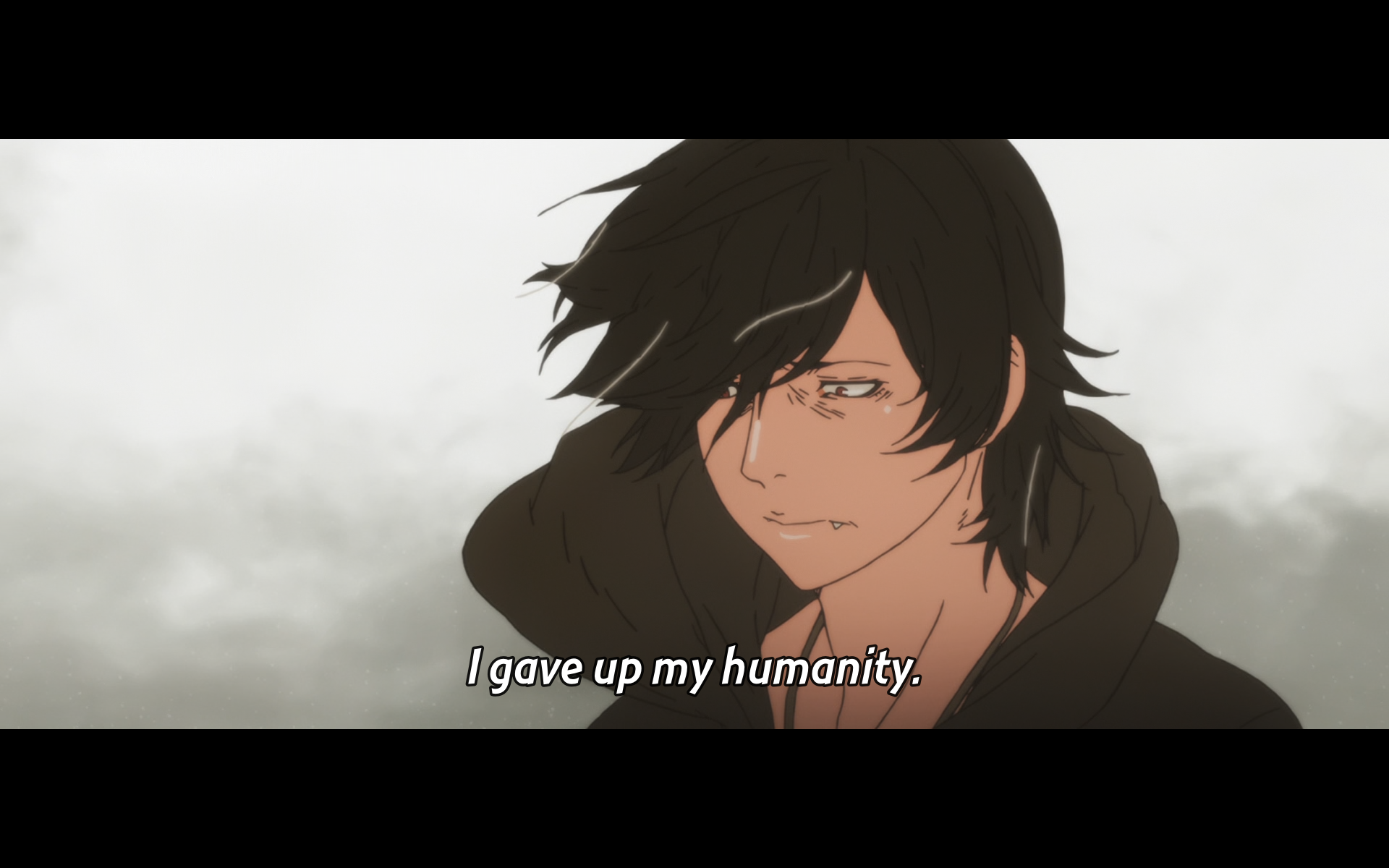
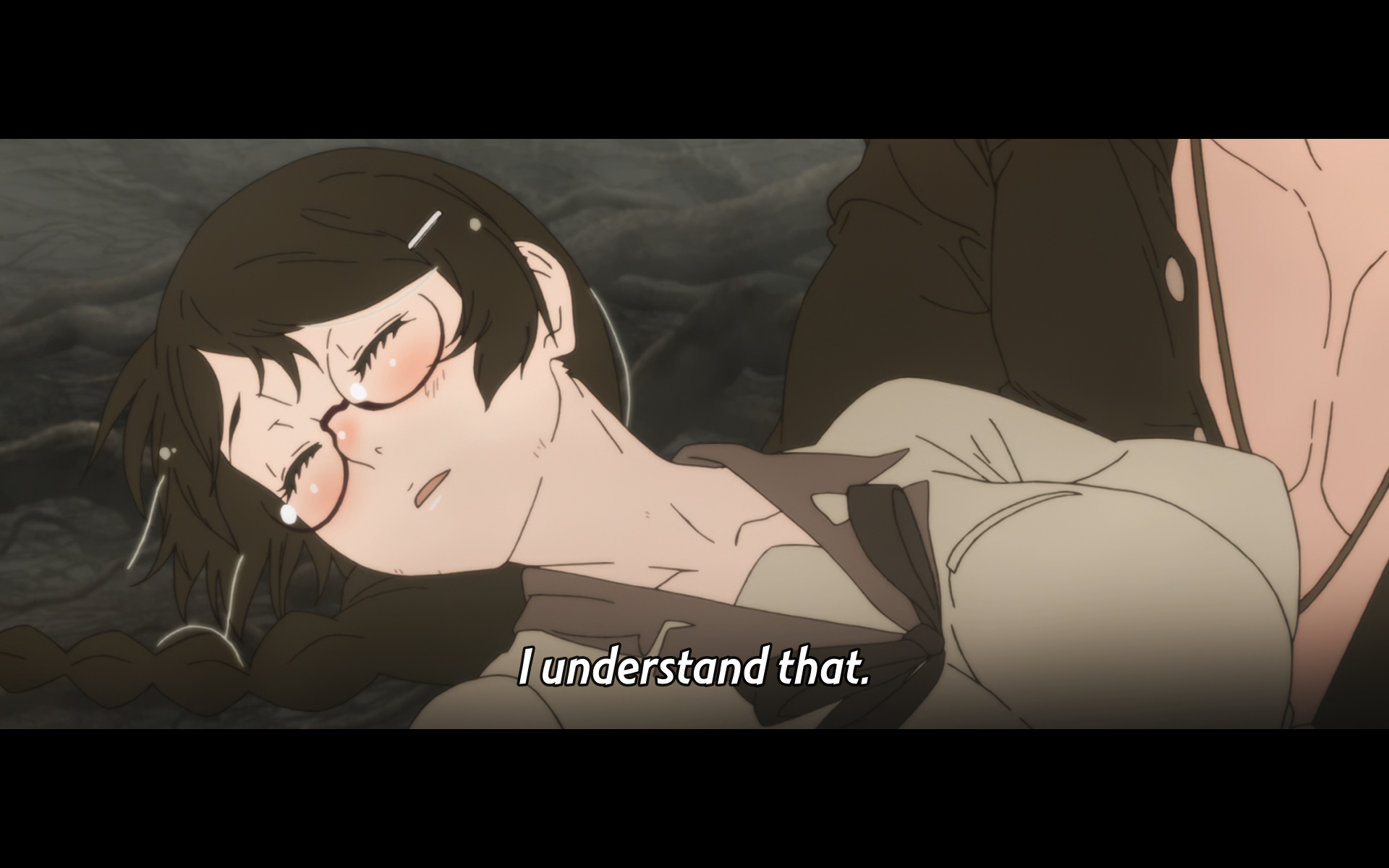
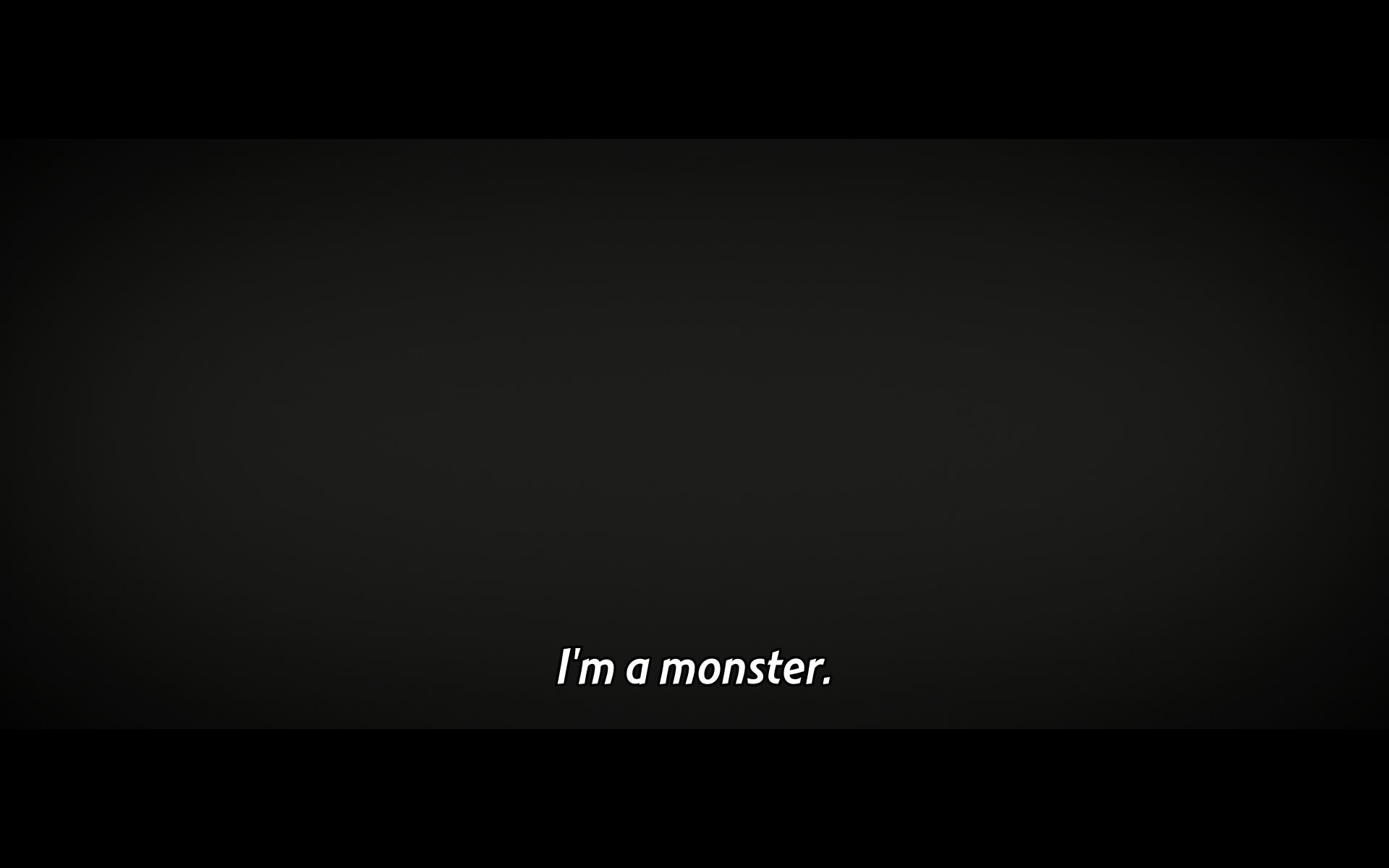
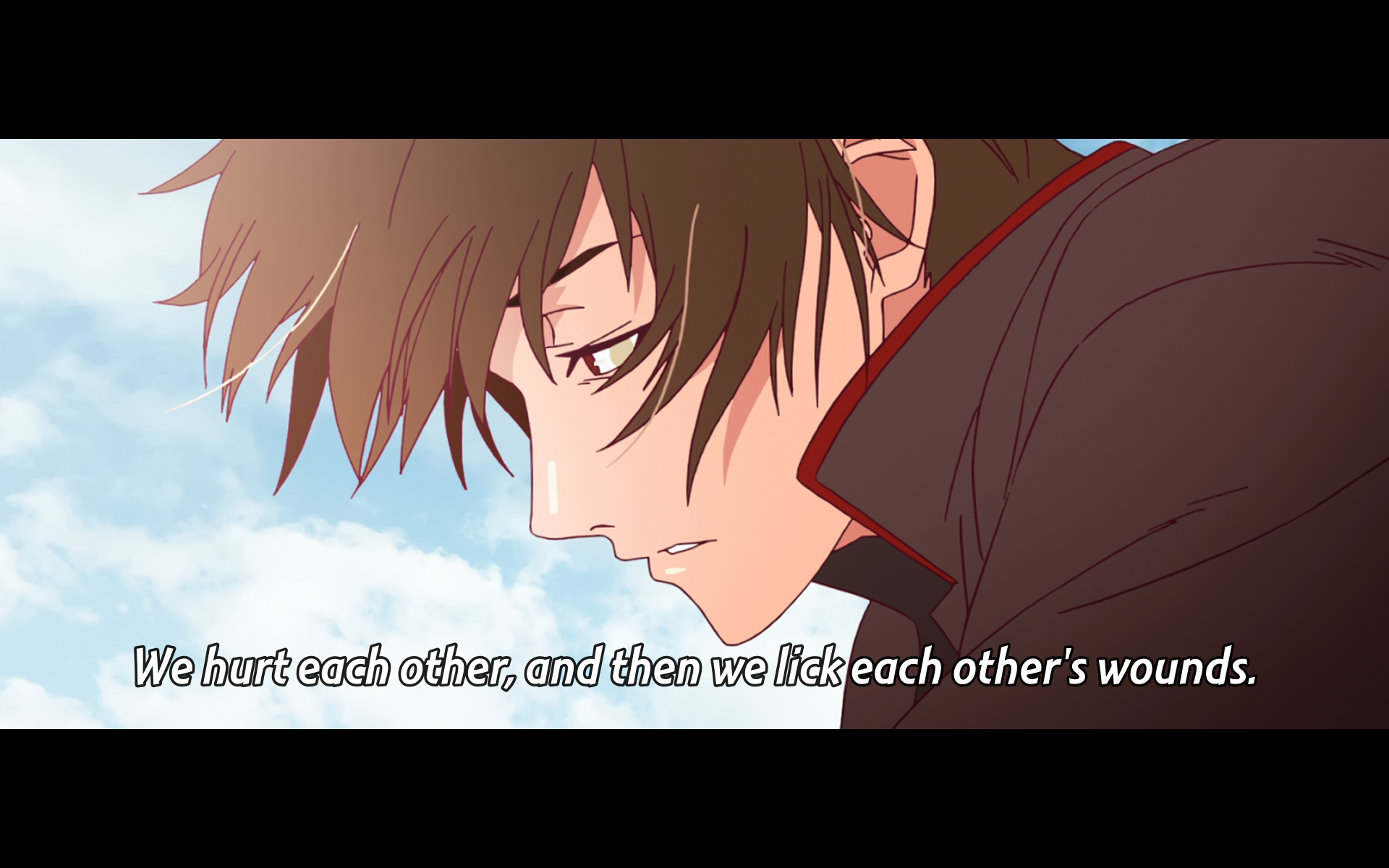
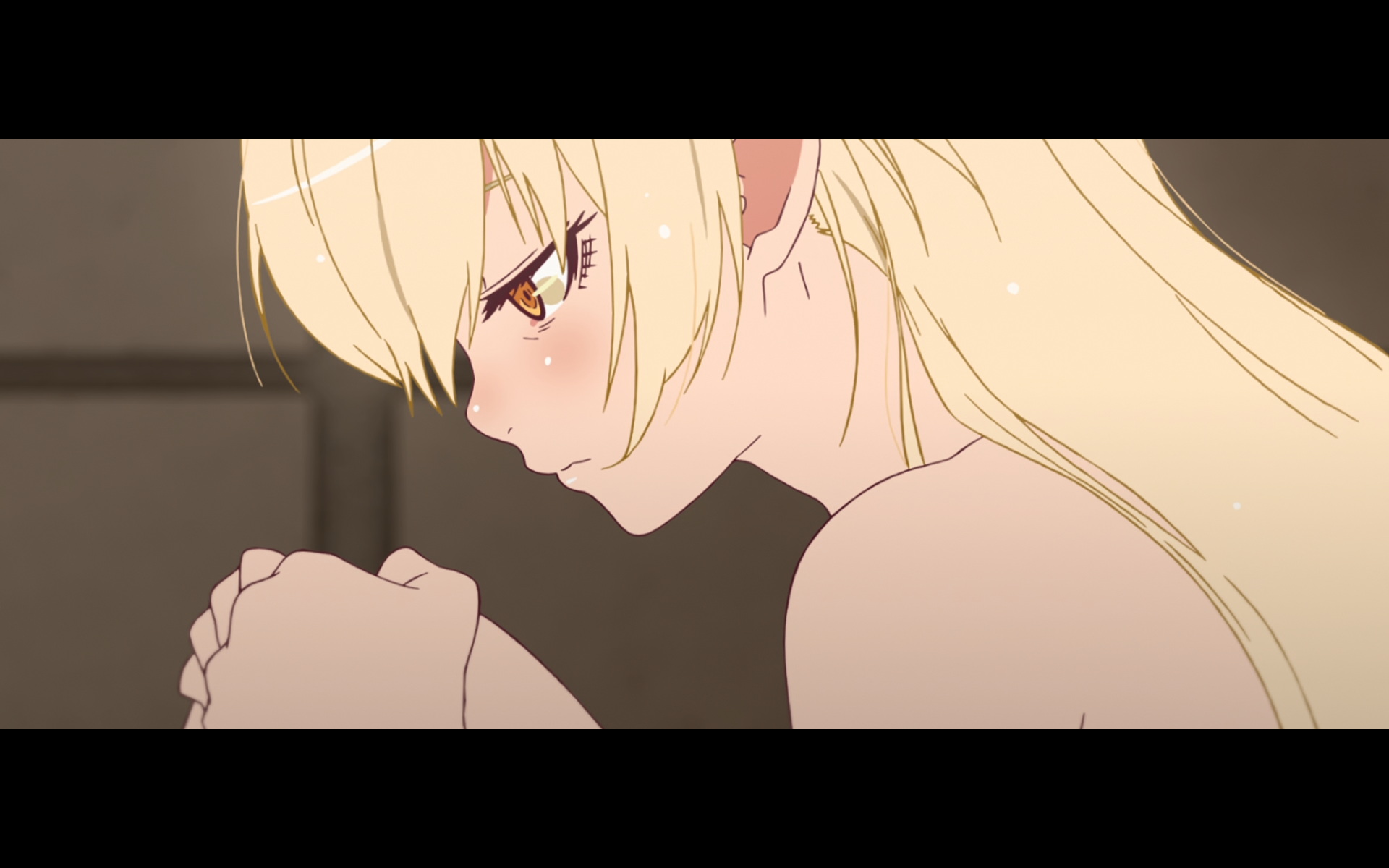
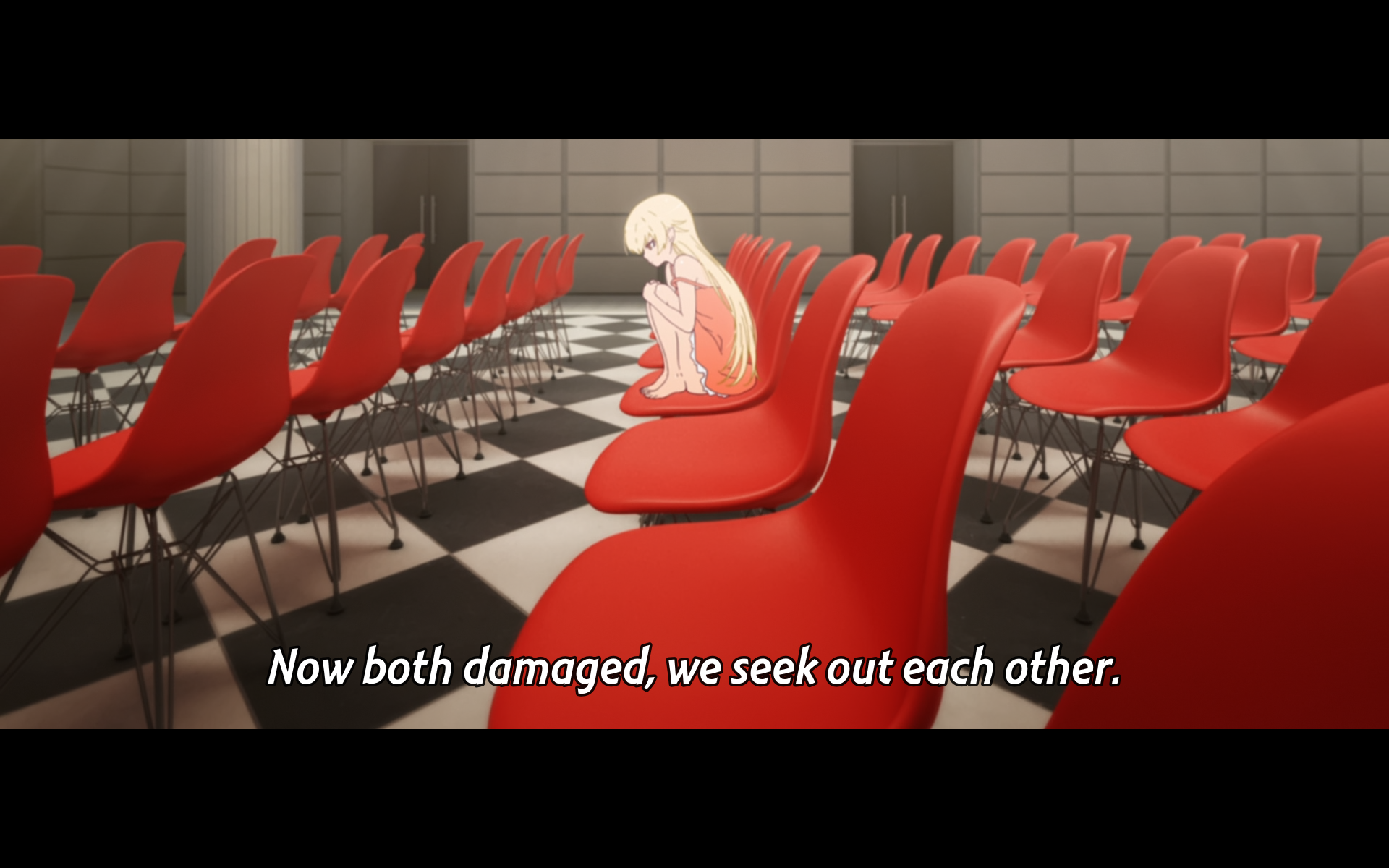
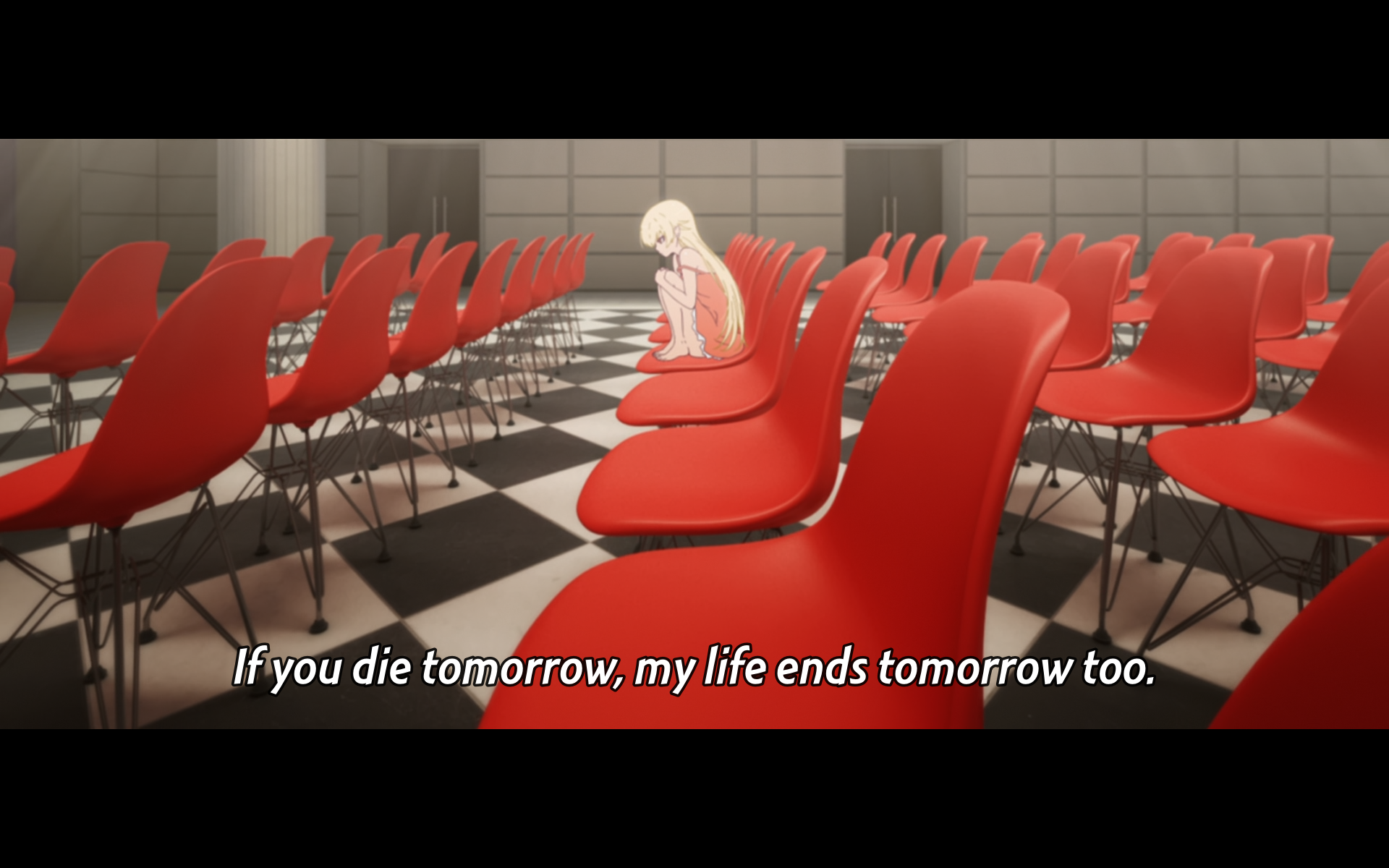
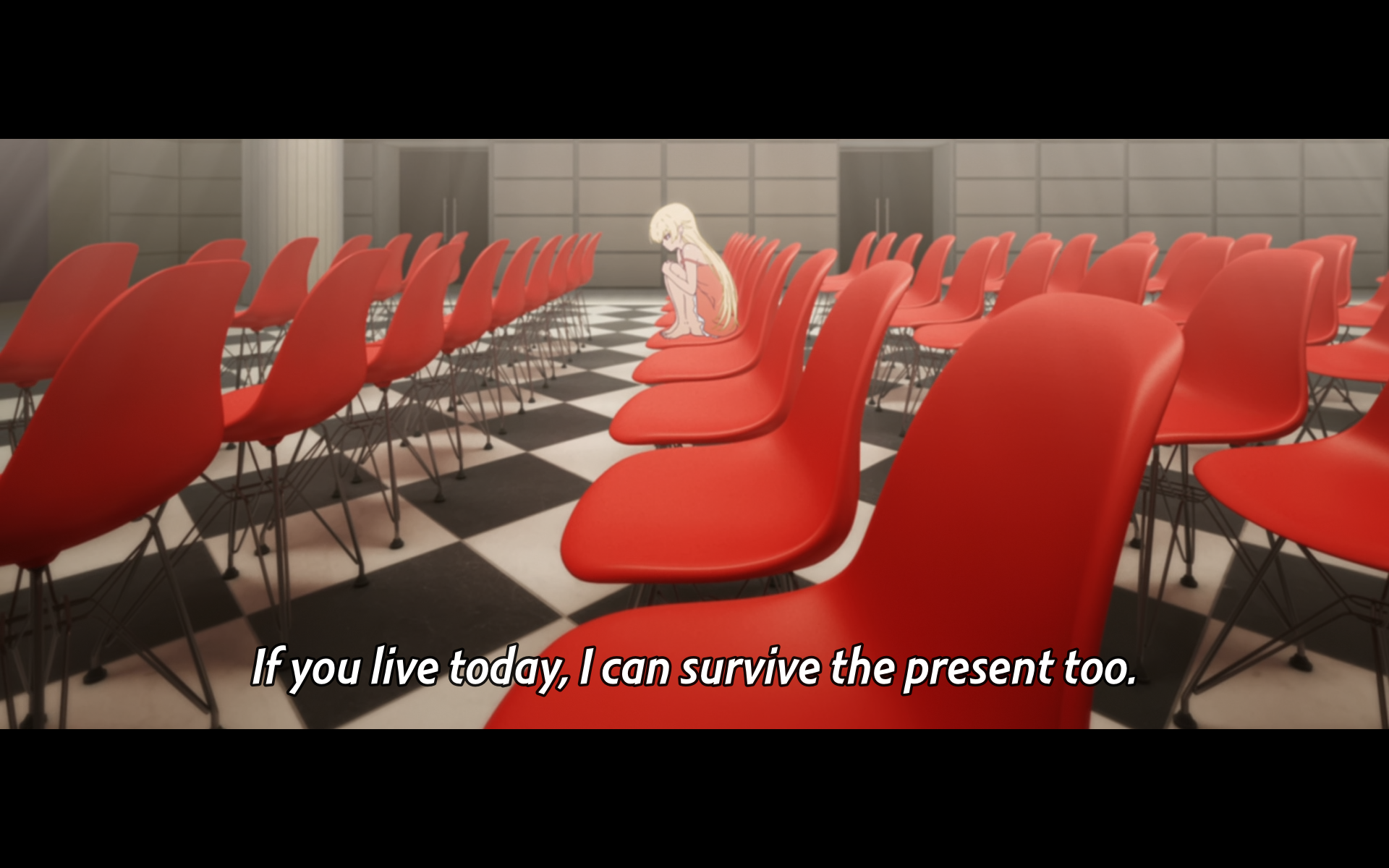
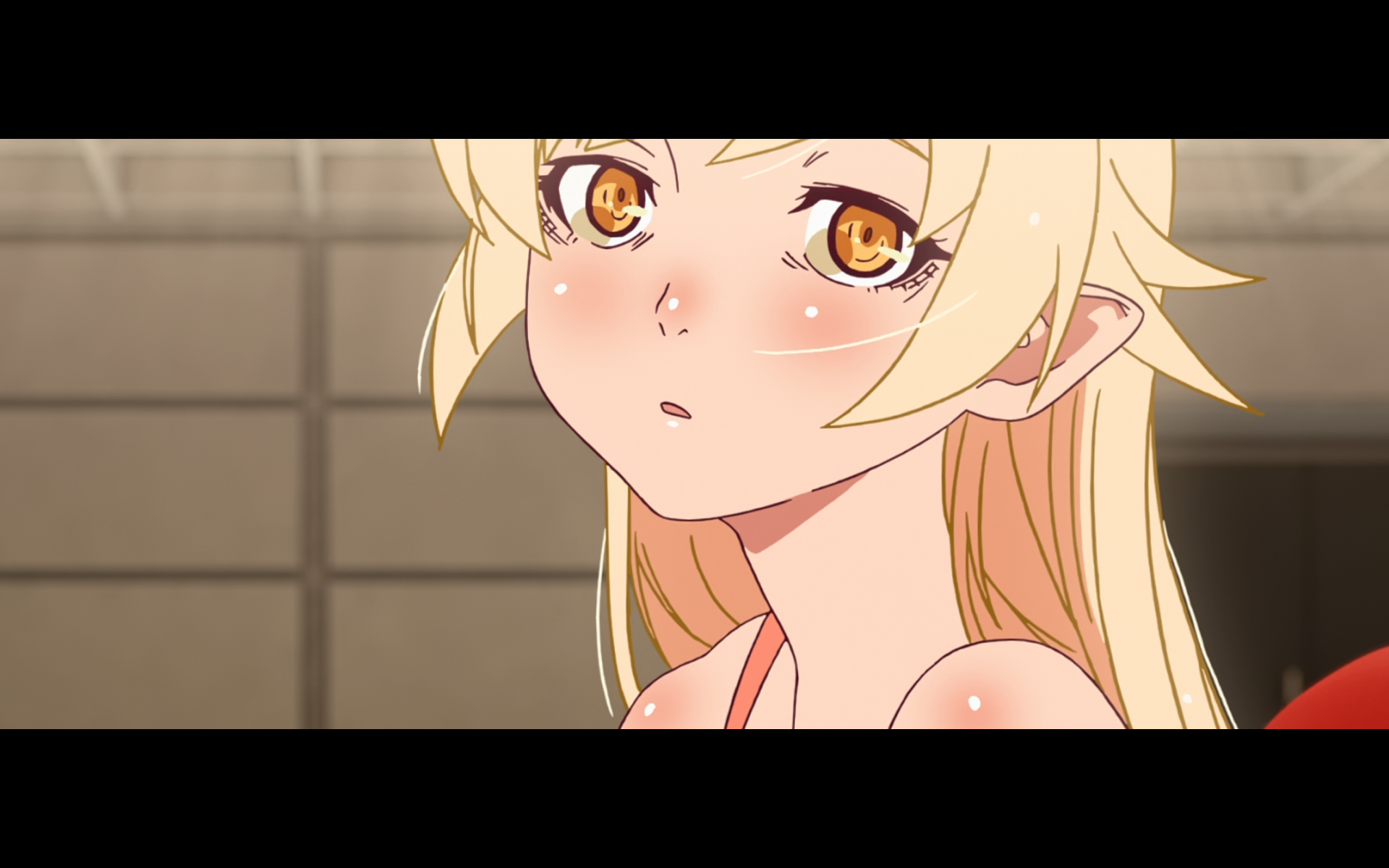
Put a pin in this one for Kiss-Shot's expression.
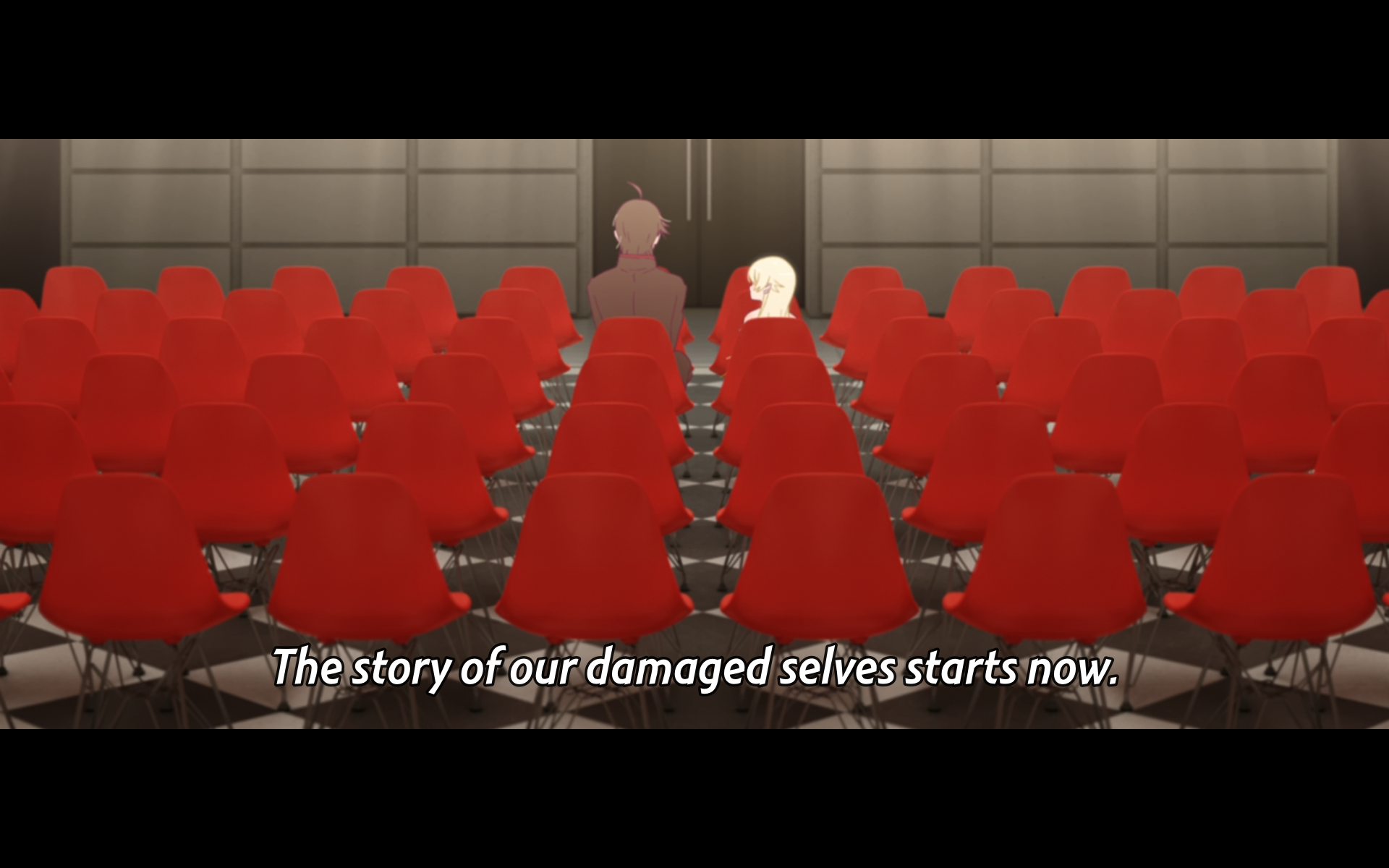
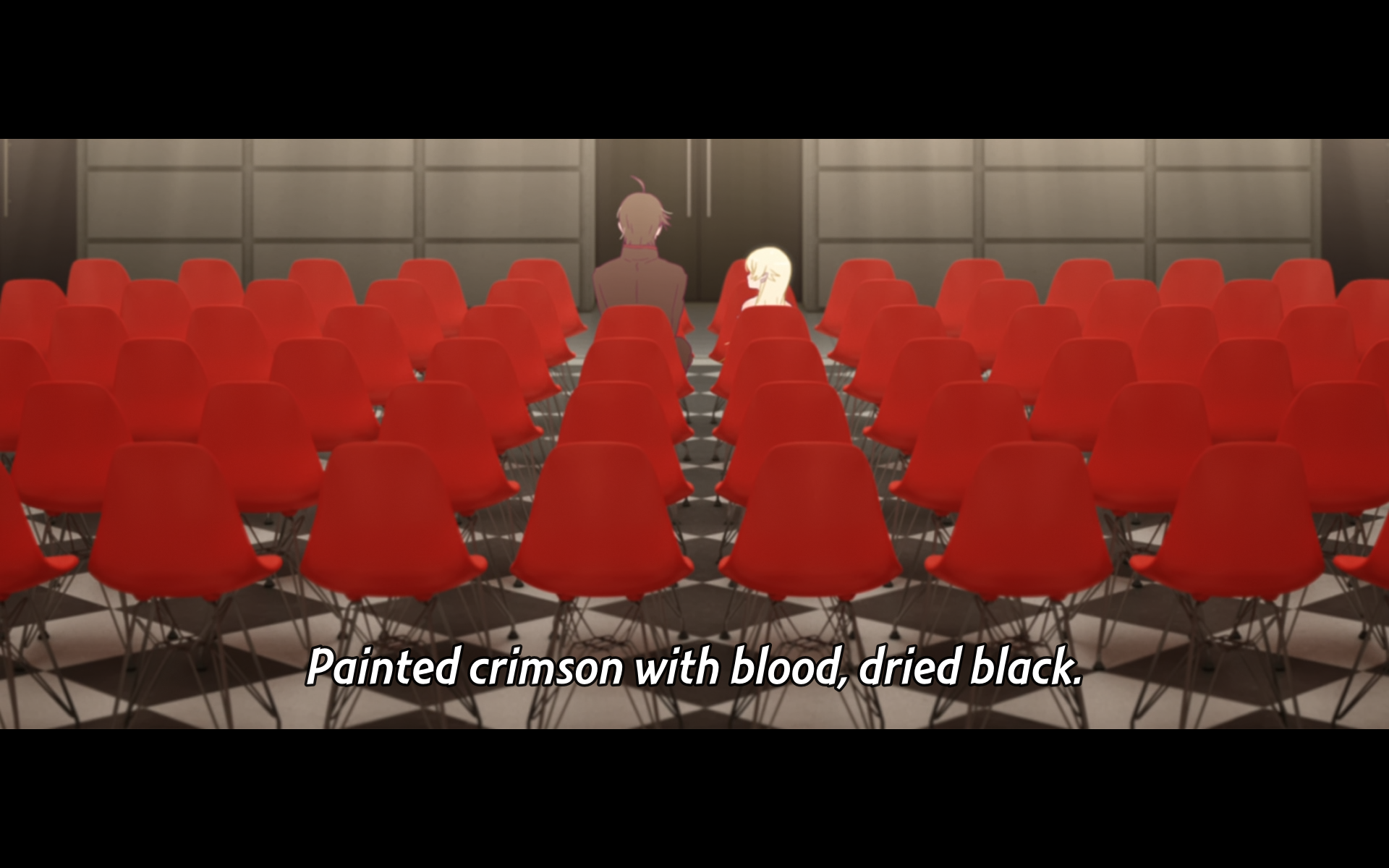
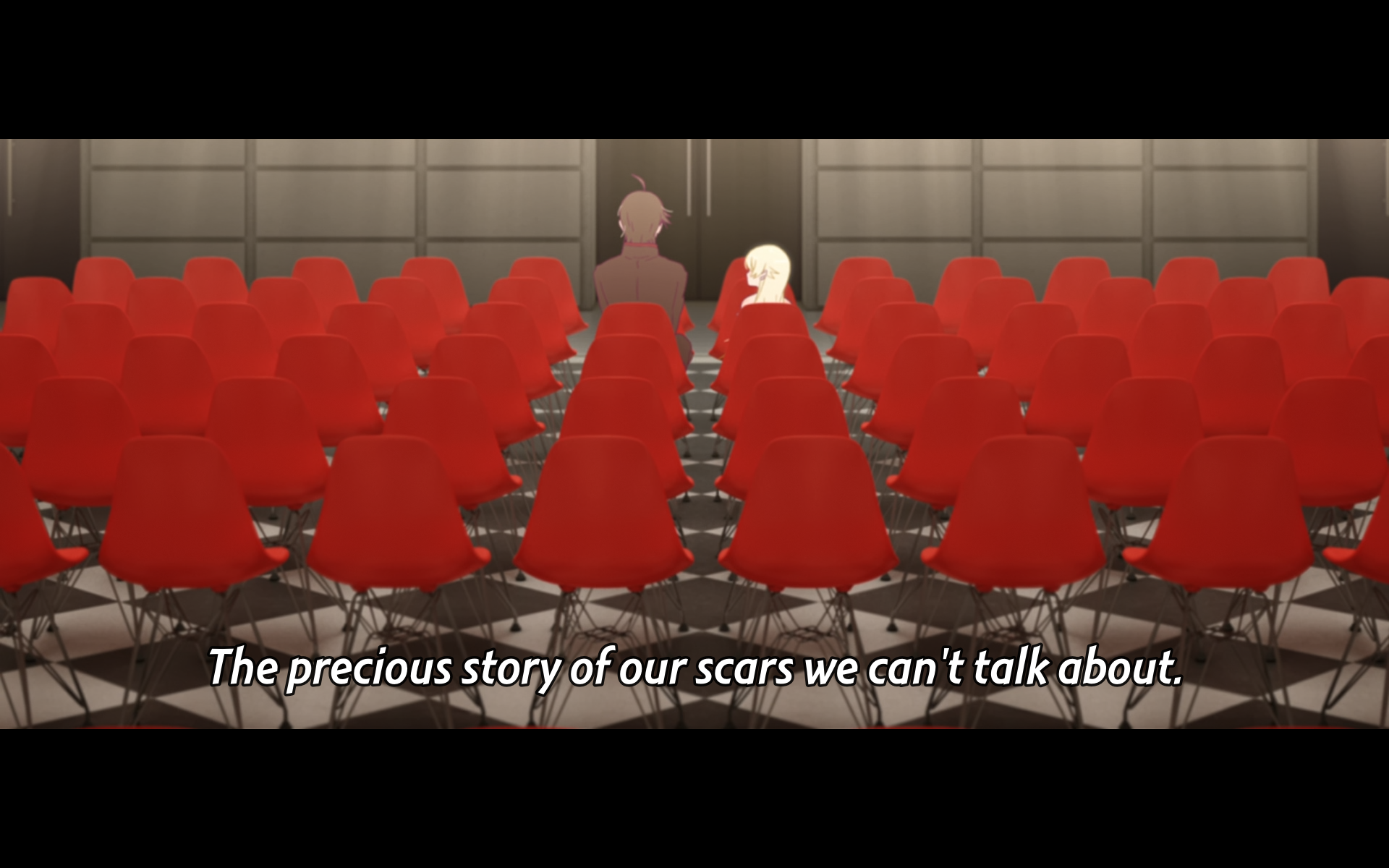
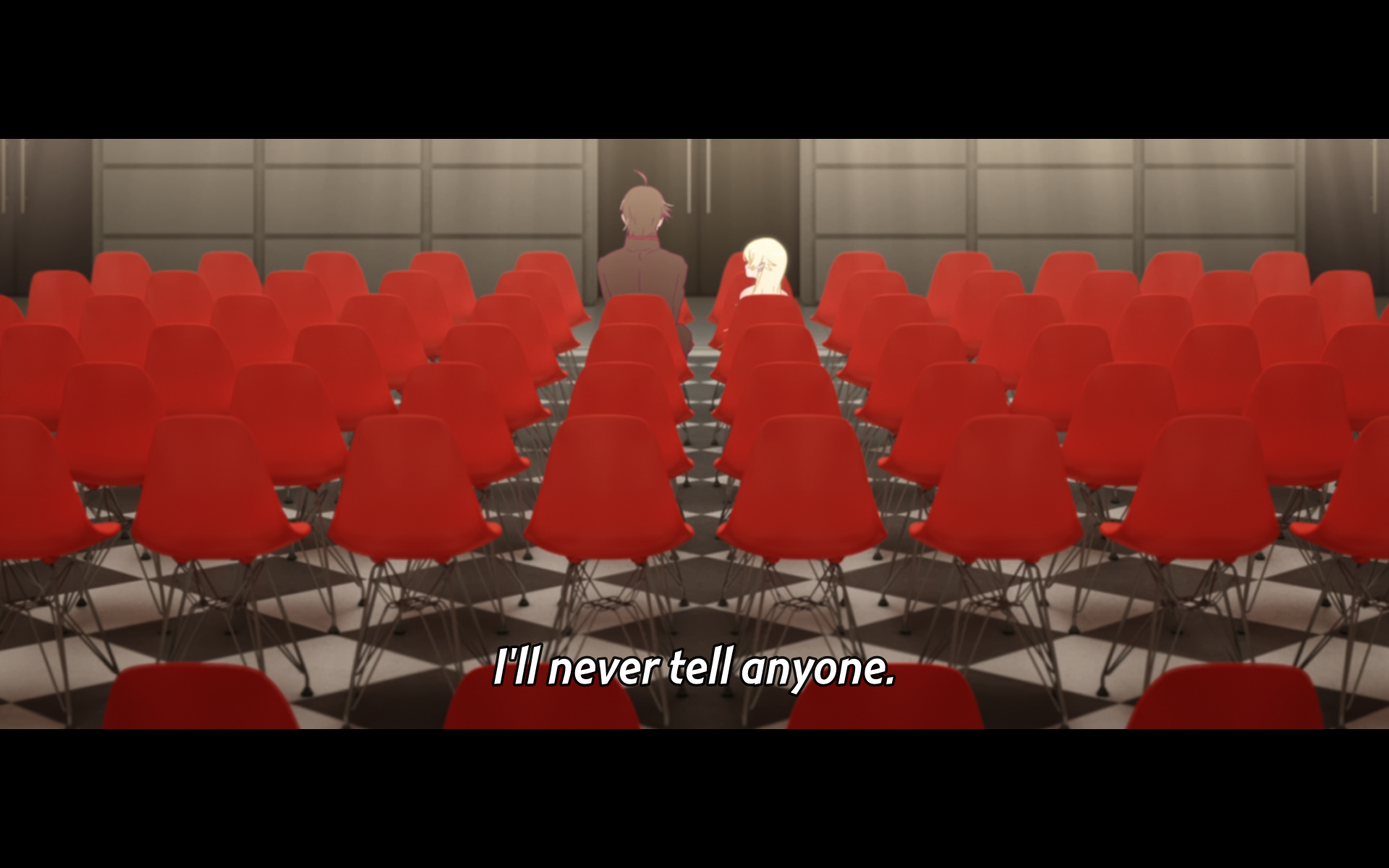
i also will never talk about the story of my scars, if that's okay. i'll never tell anyone. bits and pieces might slip out sometimes, when i'm upset, but that's not the same thing. that can't be called "the full truth," and an incomplete truth is no truth at all.
Regardless rest assured that I have one, my own Kizumonogatari, and that so many things about this one resonate so strongly with the waves of its shape. The big one is how vulnerable both parties are to each other. Equal footing sneaks up on you. It's not until this ending when the viewer is, I feel, forced to confront the former Kiss-Shot's feelings of loss. In the first film I was watching in rapt horror as Araragi fell under the kind of spell I fear most, compelled to give himself up for this scattered flower of scarlet; but then she is a plot point. A pile of petals. Her desperation is relayed to Araragi in the kind of PoV shots Bakemonogatari has trained us to accept as Araragi's subjective viewpoint, so we see pain on the face of a monster and presume it to be a trick. We, the all-knowing chorus, of course would never fall for a monster's humanity. We scream at the screen at the character in the horror movie, going down the steps (eternal escalator) to the basement (subway station) with the monster (this one cannot be substituted); or at least, I did this time. I remembered the battles, and the pain of Araragi and Hanekawa both as the righteous human actors. They had all my empathy, truly, with none left to spare; in a story that ends recalling the 'hedgehog's dilemma' from Neon Genesis Evangelion.
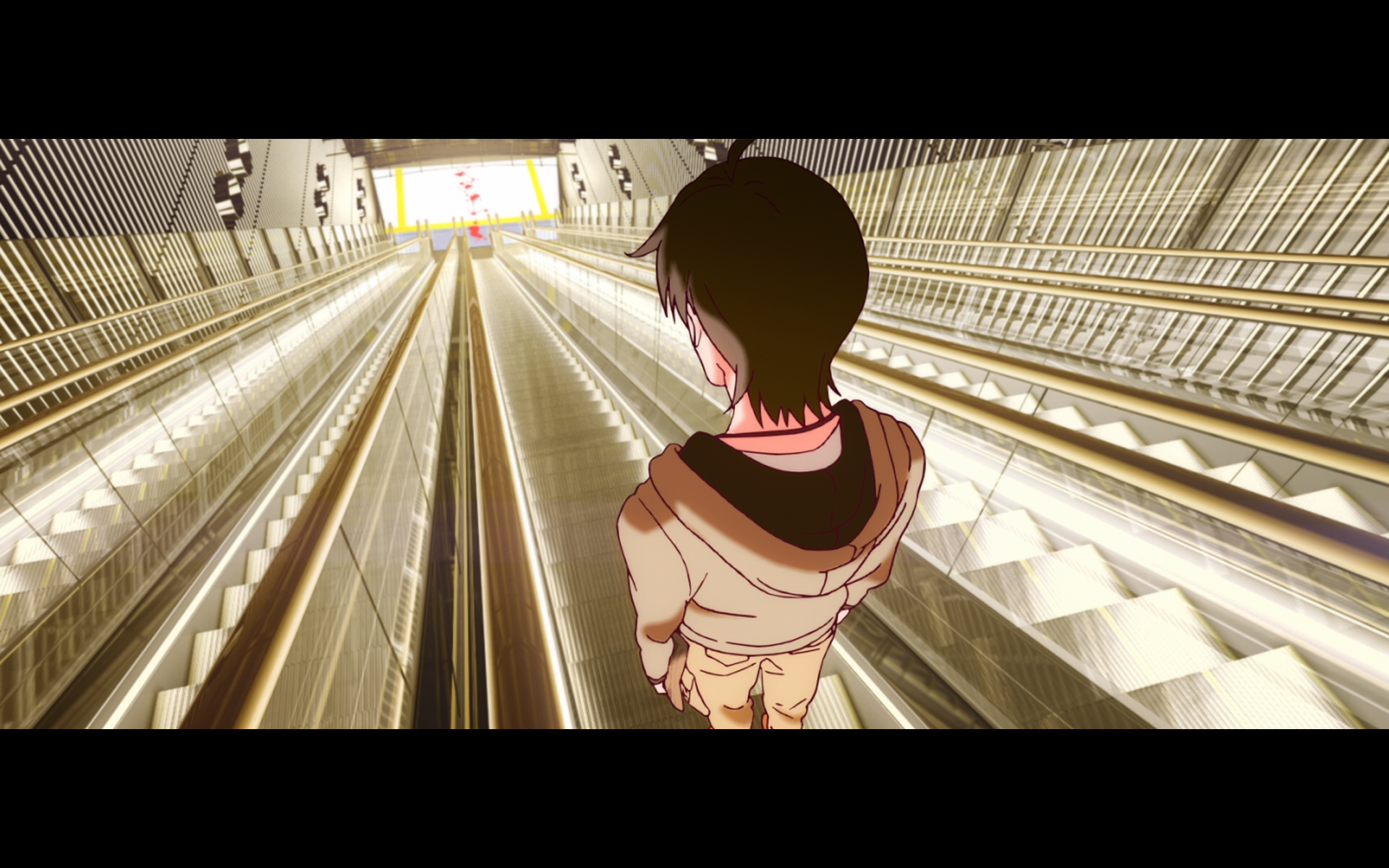
That's what made this particular ending so eviscerating. Can it really be called a twist? The former Kiss-Shot obviously suffered a wound; the reduction of her vampiric powers, in parallel with the bloodletting and in accordance with the taking of a thrall. Given her role as antagonist, not just to these arcs but to the series as a whole, I wasn't expecting to feel anything for her. She hurt a character I identify with in a way I feel in my chest every day. But, unfortunately, even still... The face she makes in the shot i put a pin in has resided in my subconscious as the image I associate with some of my grimmest emotions. I cannot stress enough that this is the picture of near-catatonic despair to me. It shatters me. And for as obvious as her loss is from the start (the end of Bakemonogatari,) she was too quiet about it here. If that expression can ever be called subtle. Justifiably, it screams. She took a sharp slice to the "odd" nature about her. She could now be mistaken for an ordinary little girl in a motorbike helmet who likes golden chocolate donuts from Mister Donuts–at any rate, not a vampire. She hides in the shadows now, where she used to lie bleeding flourishes as an introduction on the sheer white floor of Purgatory Station. She was a force of aesthetic persona to be reckoned with just as Araragi was a force of humanity.
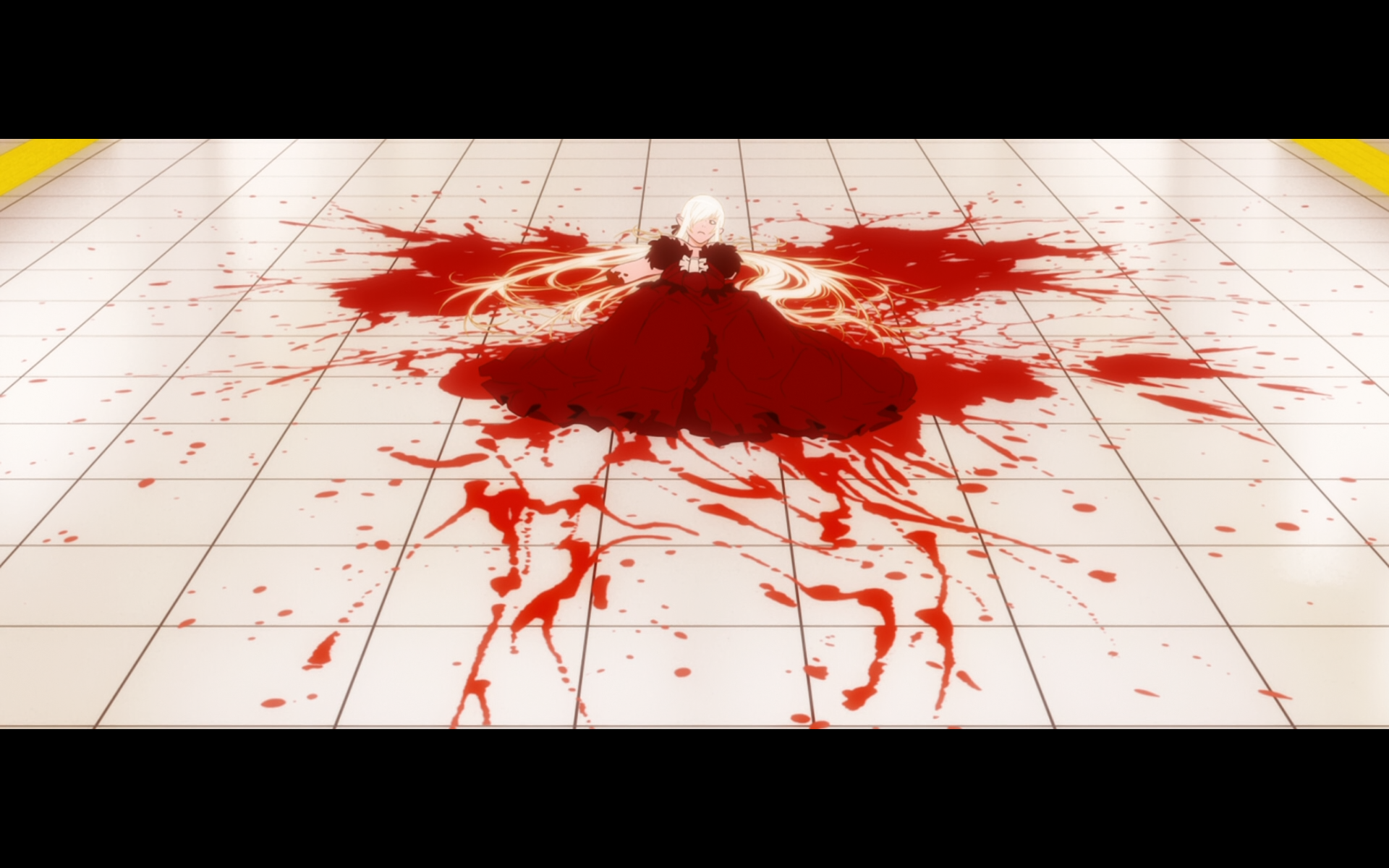
But then, I said I feel for Araragi a whole lot more. And I... I think I do, yeah. Maybe not a whole lot more. Maybe just deeper. The main sticking point for me is how little he did wrong. Please put the pin from Kiss-Shot's expression here, in Araragi's general innocence in all this. (Maybe it's just my own maturation since last watching but it really strikes me how early in the series' timeline this is. Hanekawa and Araragi's interactions in particular feel very "clumsy first attraction." And that might just be the Monogatari series's trademark awkward direction in conjuction with the much more detailed backgrounds, but it's cute nonetheless.)
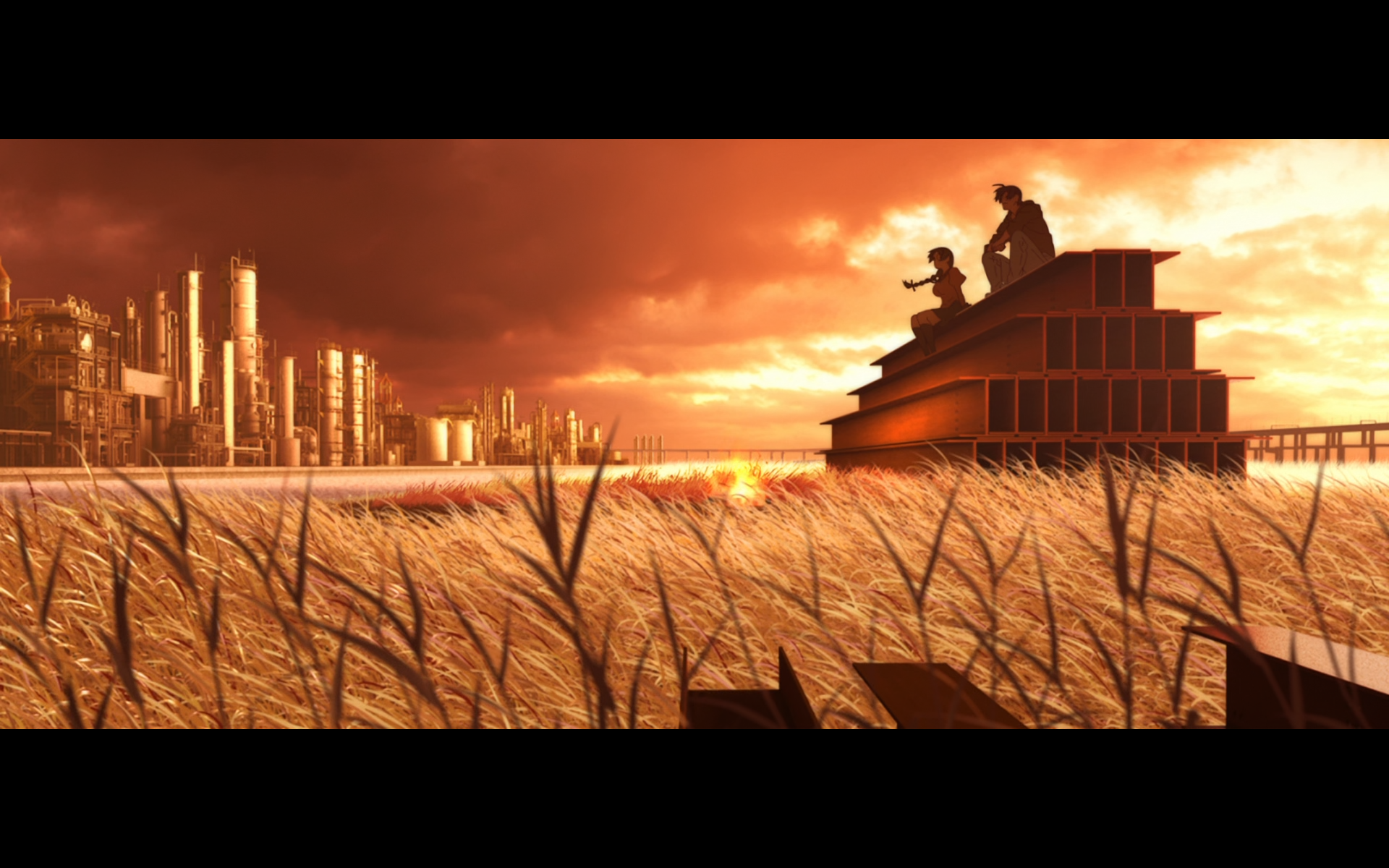
And it contrasts with what I knew was coming. Not even because I knew he was attacked by a vampire; his backstory being "the story of wounds" always made more about him make sense. It's not until this rewatch where I can point to "he was attacked by a vampire over spring break" and "he saw the most brutal reality of what he had become with best intentions." All that beauty, all the beauty of Kiss-Shot's ascension stages, and it still ended with her in a classroom in a cram school gorging herself on a corpse. An image so horrible it led Araragi to betray the nature that started all this and attack Kiss-Shot for the sake of that same nature's continuation, his becoming-human again, as she had proven gleefully it could not exist in the form she made for him. So he robs her of her nature, wounds her, cuts her down to a new form in turn. And the story starts there.
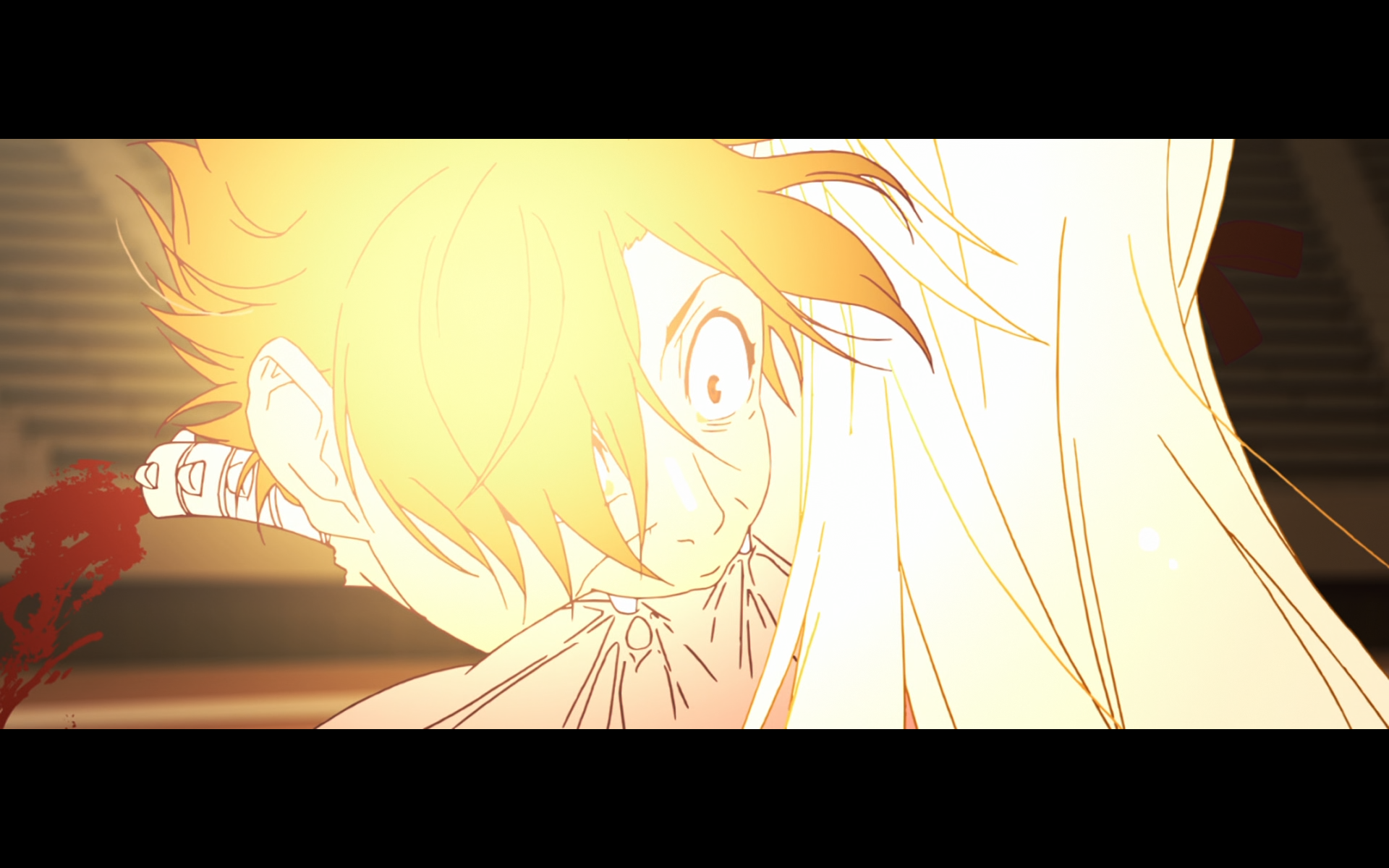
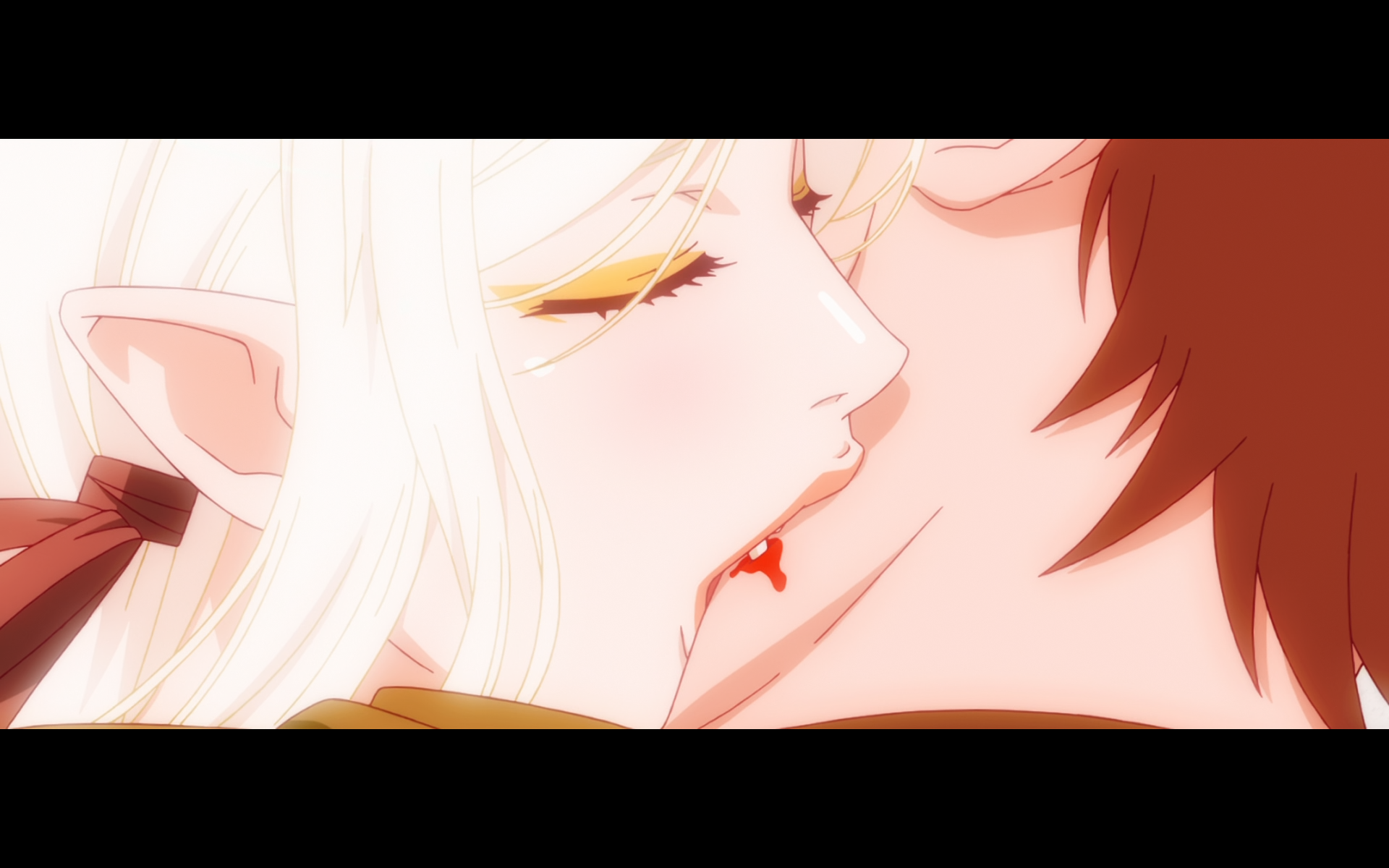
I mentioned the hedgehog's dilemma earlier but I feel like the fated painful "contact" here being described not with prickly animals jabbing each other for warmth, but with lifelong wounds born of desperate desires(needs)... well. It's not that the search for warmth isn't life-or-death, but it doesn't at all feel like it when described that way. The hedgehog's dilemma serves its purpose as a pleasant description of an intolerable truth, almost more euphemism than metaphor. Looking at "wounding each other and licking each other's wounds," it's... I don't know how to not take these characters seriously here. I have cried over this ending scene more times in the last week than I can count. Its wounding each other, licking each other's wounds, leaving each other wounded for life. Araragi's backstory being the "story of wounds" has always made more about him make sense, but it wasnt until this rewatch that i could finally point to sepcific parts of the text that revealed his character to me.
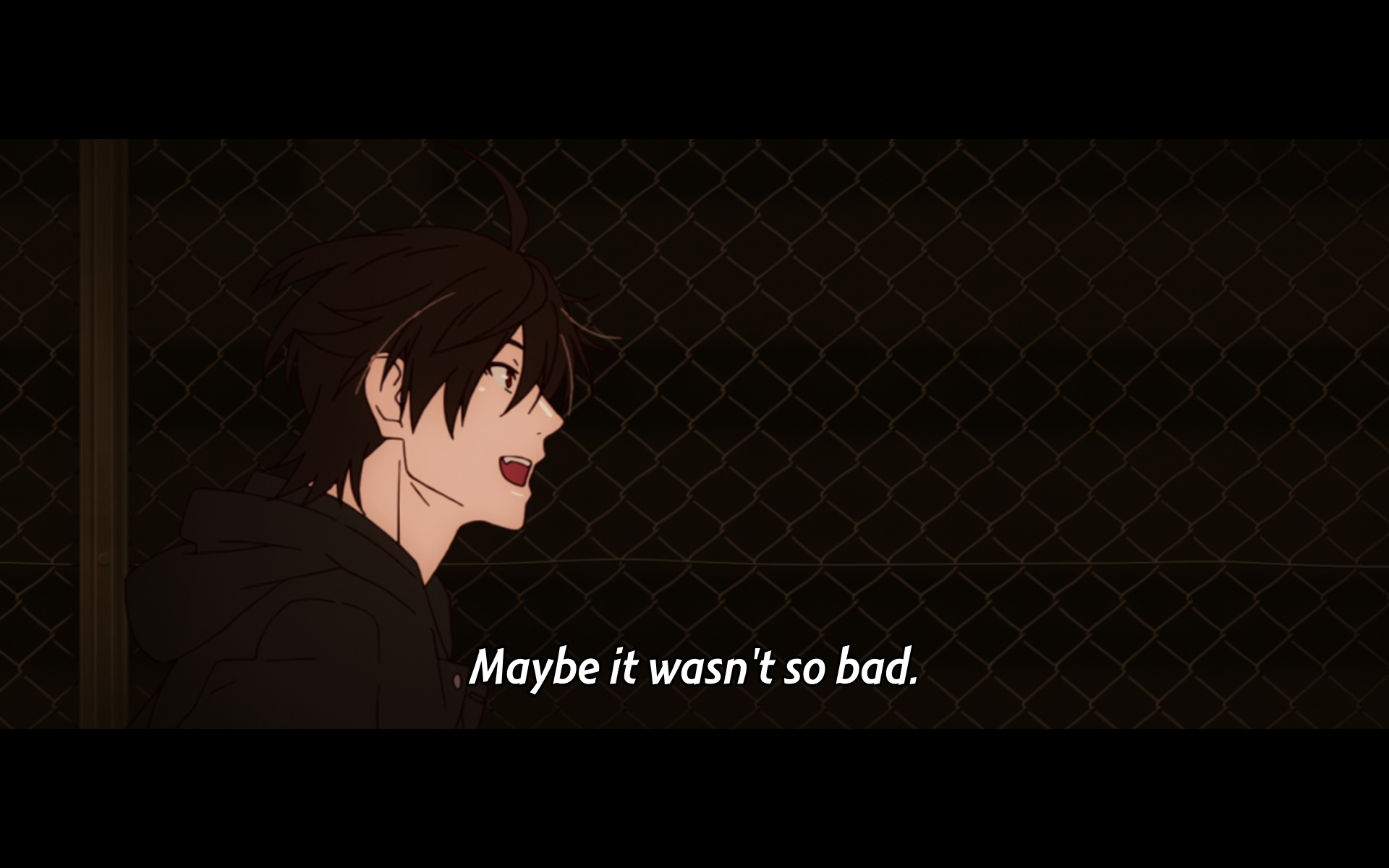
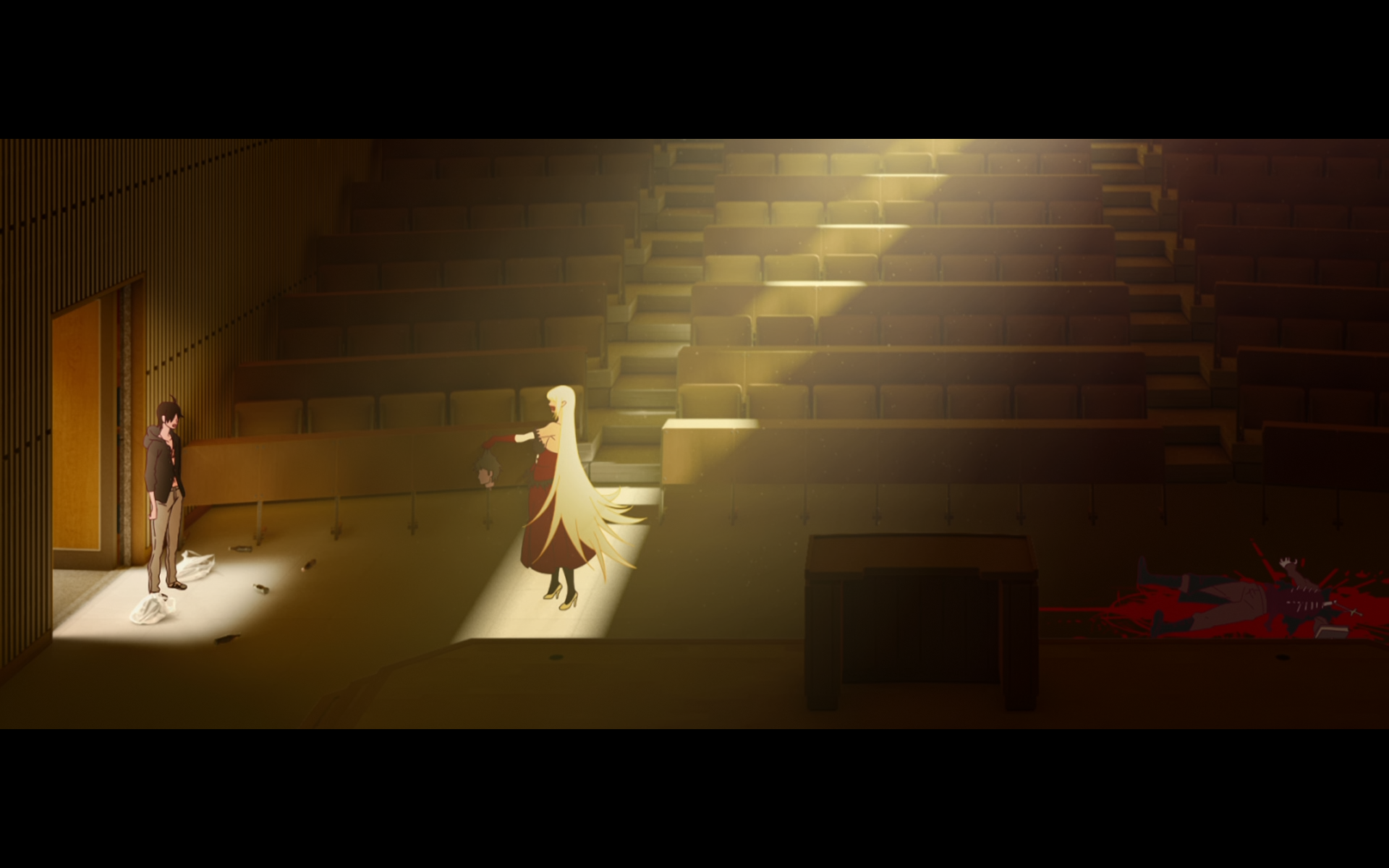
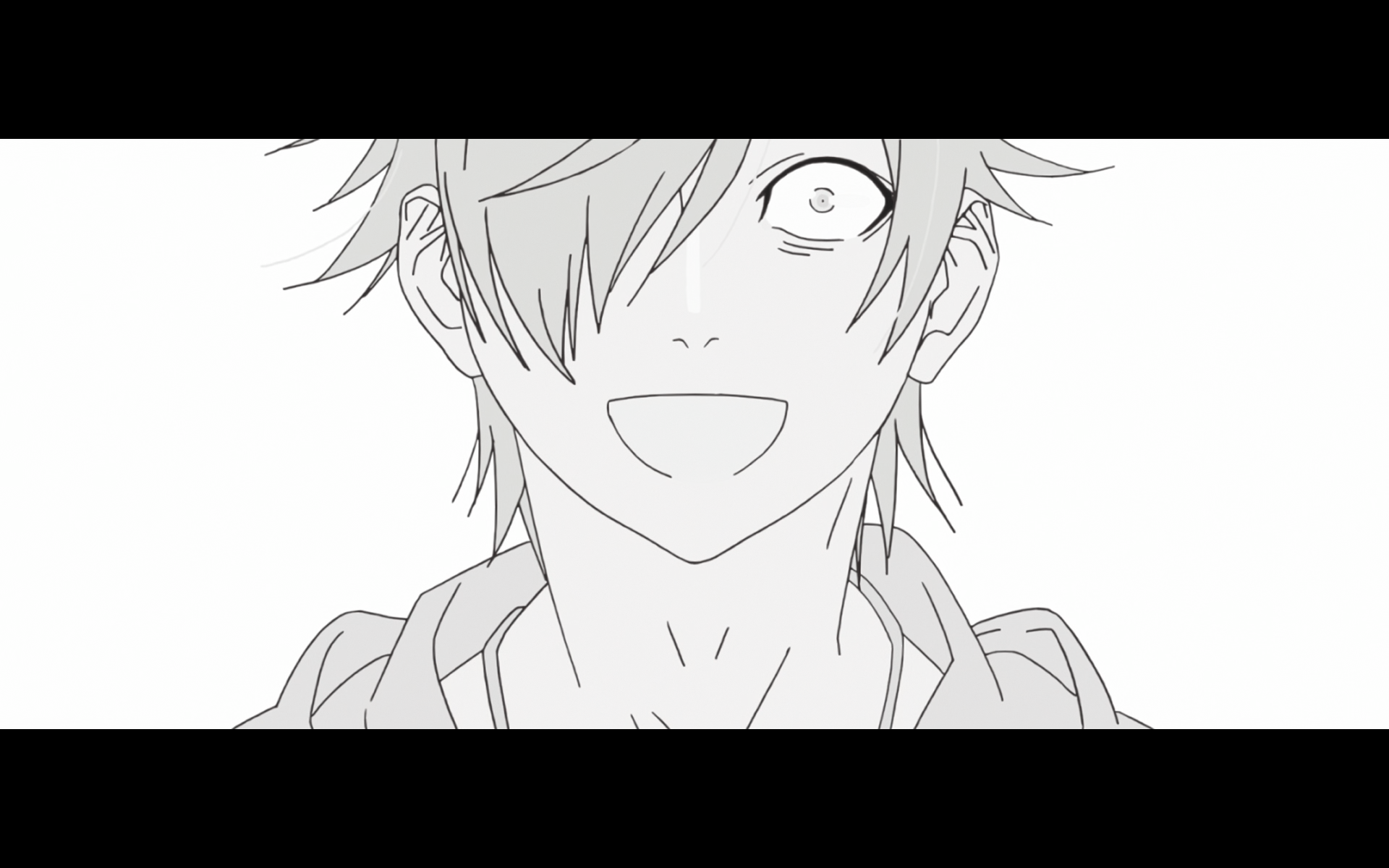
Either way I really liked Bakemonogatari for complex characters like Senjougahara and Kanbaru, the latter of whom would become my favorite in the series; I didn't give enough credit to Koyomi's story. It almost fades into the background as he's at his most pre-development sacrificial hero–living breathing plot point boy. But he's also the man who lies down with the love of his life and looks at the stars with her. He's the damaged, reprehensible lover...
Because it was a loving nature that made him a monster, right? First pin. Love, expressed clumsily as an attempt at a righteous sacrifice, led to him becoming a vampire. The story of his wounded self begins with an act of doomed love, though he doesn't know it. However monstrous, being as he is unrepulsed by monster nature and thus missing human nature already, from her thrall or his nature as a human, it is still the call to help. He did have to help, and so he was already a vampire. Before the subway bloodletting, he loses something irreplicable here.
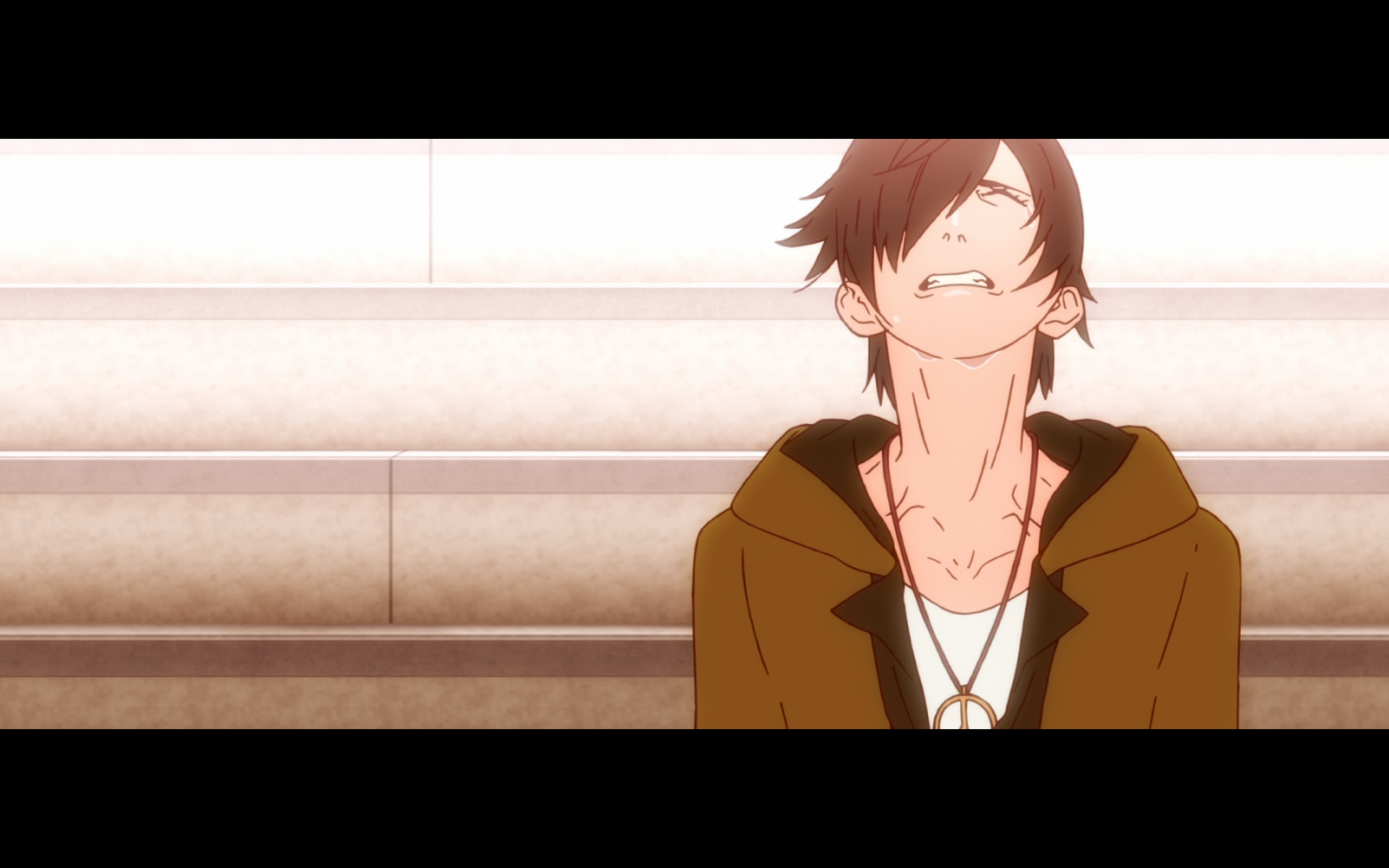
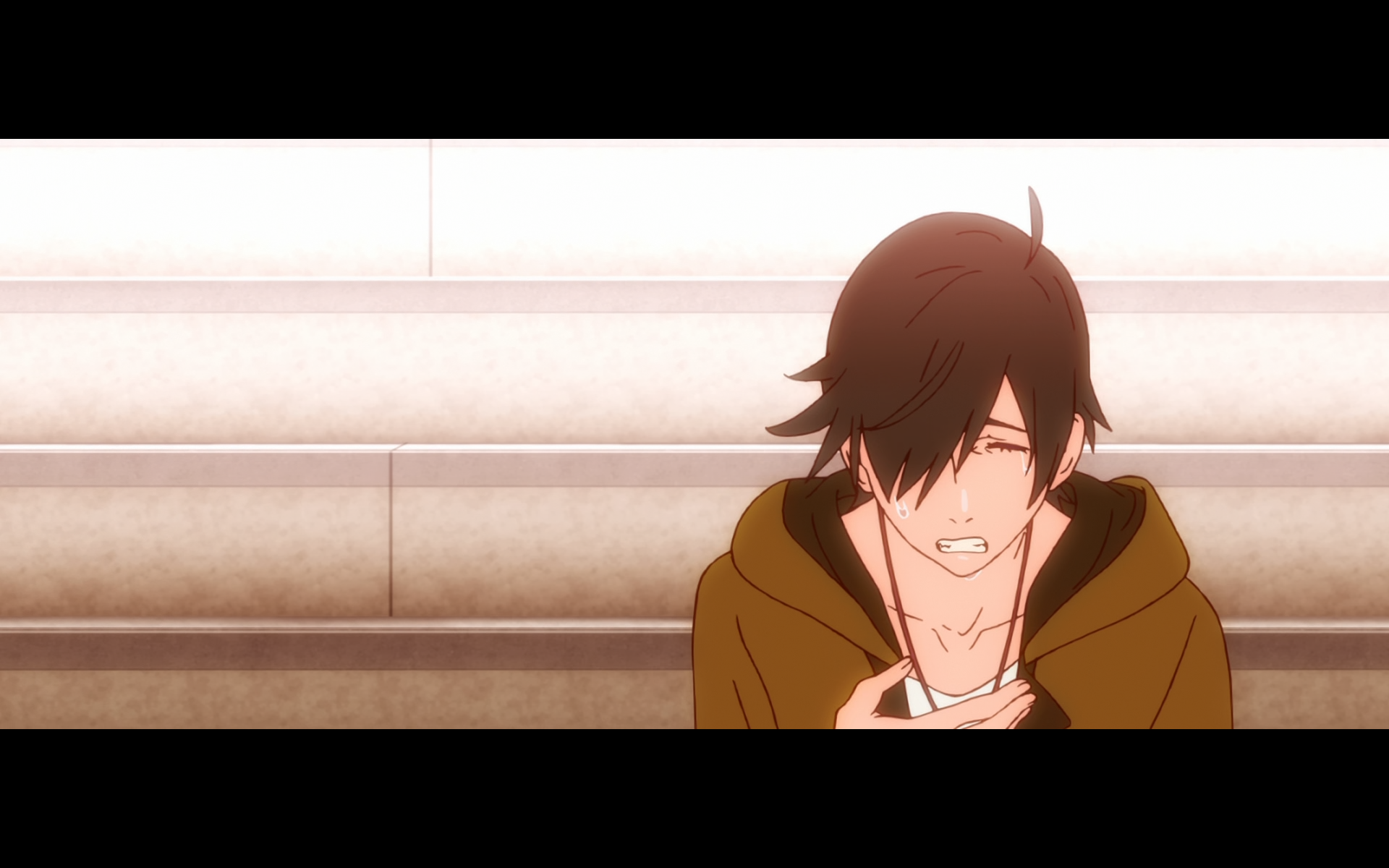
Please remember this. It seems–no, it is important.
And also please remember, no matter how wrong-headed it was in trying to save someone that Araragi became "damaged goods". It was best intentions that led him to, nearly a year after that spring break vampire attack, lose his reflection.
So what? Most vampires lose their reflection. Its a clever bit of writing; as is explained at the top of the arc, oddities (like vampires) are given form by their observers. Not made, but shaped, into vampires, crabs, snails, monkeys, snakes, cats, bees, phoenixes... etc. and that by the same token humans are defined by observation as human. An oddity is that which is seen to be odd, and a human is seen to be not.
So Kizumonogatari is the story of a wound which, even after years, reduces its victim's humanity to what little may be observed, rather than in the act of observing. If I call it "traumagenic depersonalization" that undersells it. Clinical words like that can never express the feeling properly. I'll never cry reading a doctor's report and I'm not special. So I won't talk like that anymore. At any rate it hits him like the vampire bite stealing nature with blood. This, too, is Kiss-Shot feeding in the classroom; this, too, is disillusion and disenchantment. The flesh-eating, un-reflecting nature of the vampire shatters everything around it.
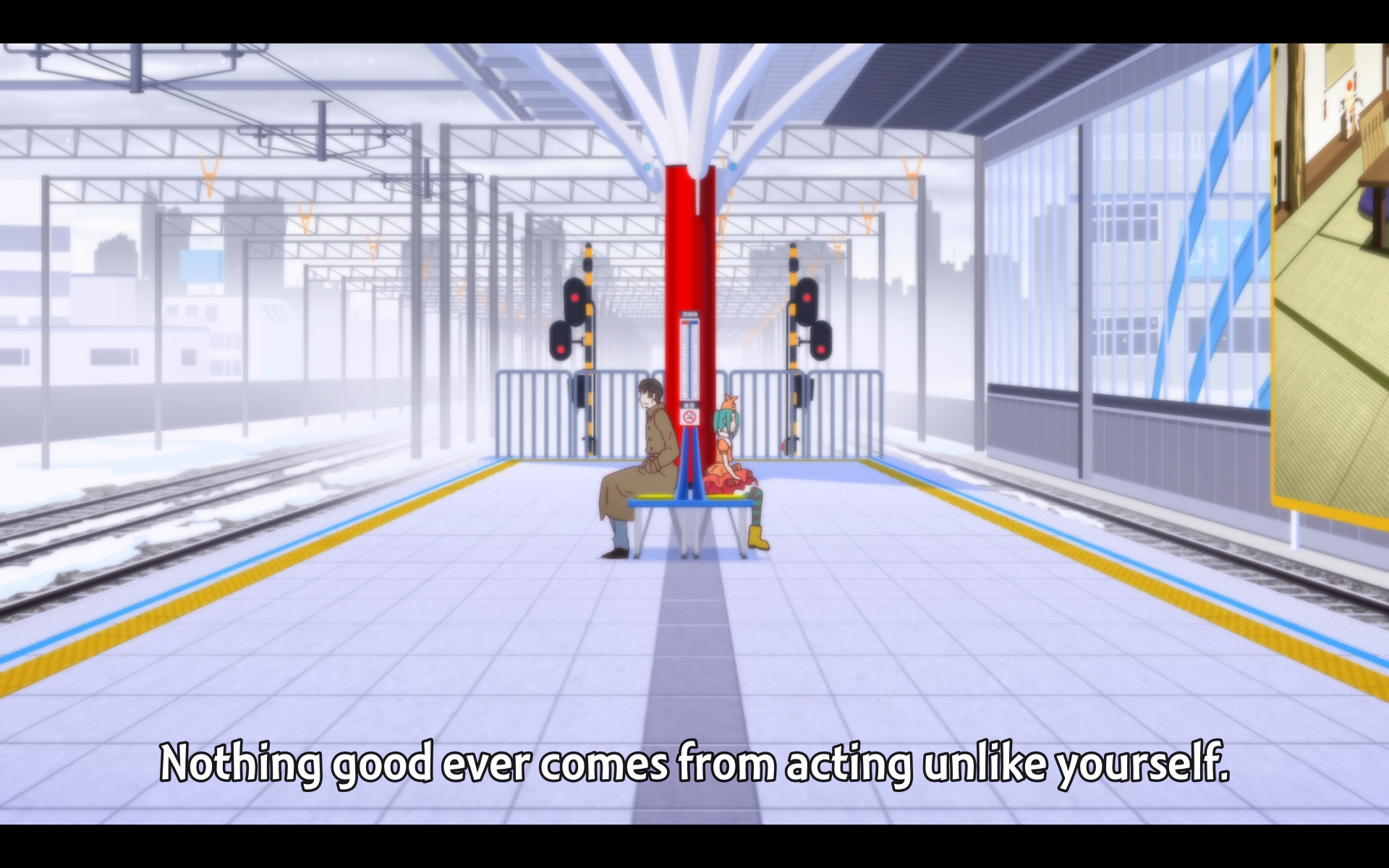
They were aces at being themselves. In Araragi's case, acting like himself brought him to offer his blood (thus being) to Kiss-Shot. "Acting like oneself," when that self's nature lead to its own loss, might seem self-defeating. But it's the exact opposite. Its the only way to exist again. "Acting like yourself again" is the only way to exist again once wounded. Once one's story is told in "Kizumonogatari," or seen in a spring break vampire attack, the only way to be observed is to try to be seen. To allow ones nature to be seen through a great effort.
Tsukimonogatari feels like an advancement of that wounding story, or a flashback of sorts. Yeah, Tsukimonogatari feels like Araragi's protracted flashback to that spring break. The arc opens with an explanation of Ononoki Yotsugi as a corpse made into a haunted doll by humans, who is herself acting as a human would; not to become one but to live among them. But again, one of the main themes of this arc is the nature change of observation. Oddities must be observed to do odd things in order to remain extant; her odd nature is living among humans as a doll (more on that later.) Araragi meanwhile seems to be in a very similar mental state to spring break. Again, flashback. The moment he notices his vampirism return he sends his sisters to Kanbaru's house–yes, with the worry Kagenui will return for Araragi and attack Tsukihi like she did the past summer, but there's not a doubt in my mind he's also thinking about Karen and what happened to Hanekawa over spring break as well. The last time someone he loved was around him as a vampire, she had her guts ripped out and only survived because of Araragi's now-much-weaker healing factor.
As for present day; long story short the Fire Sisters and Kanbaru get kidnapped and taken to the Shrine of the Polar Snake in what looks like a ploy for Ononoki by the dollmaster Tadatsuru but is actually an attempt to bait Araragi and Shinobu into showing up and getting killed. (Gosh I really hate having to summarize.) Araragi wants to distract Tadatsuru while Ononoki sneaks in and teleports the three girls out, Ononoki wants to blast Tadatsuru with her beam (?) attack Unlimited Rulebook, and Shinobu of course wants Araragi to give up his humanity and become a vampire. Araragi looks to have gotten his way when suddenly Tadatsuru stands up, turns around, and is basically instantly vaporized by a vast amount of light.
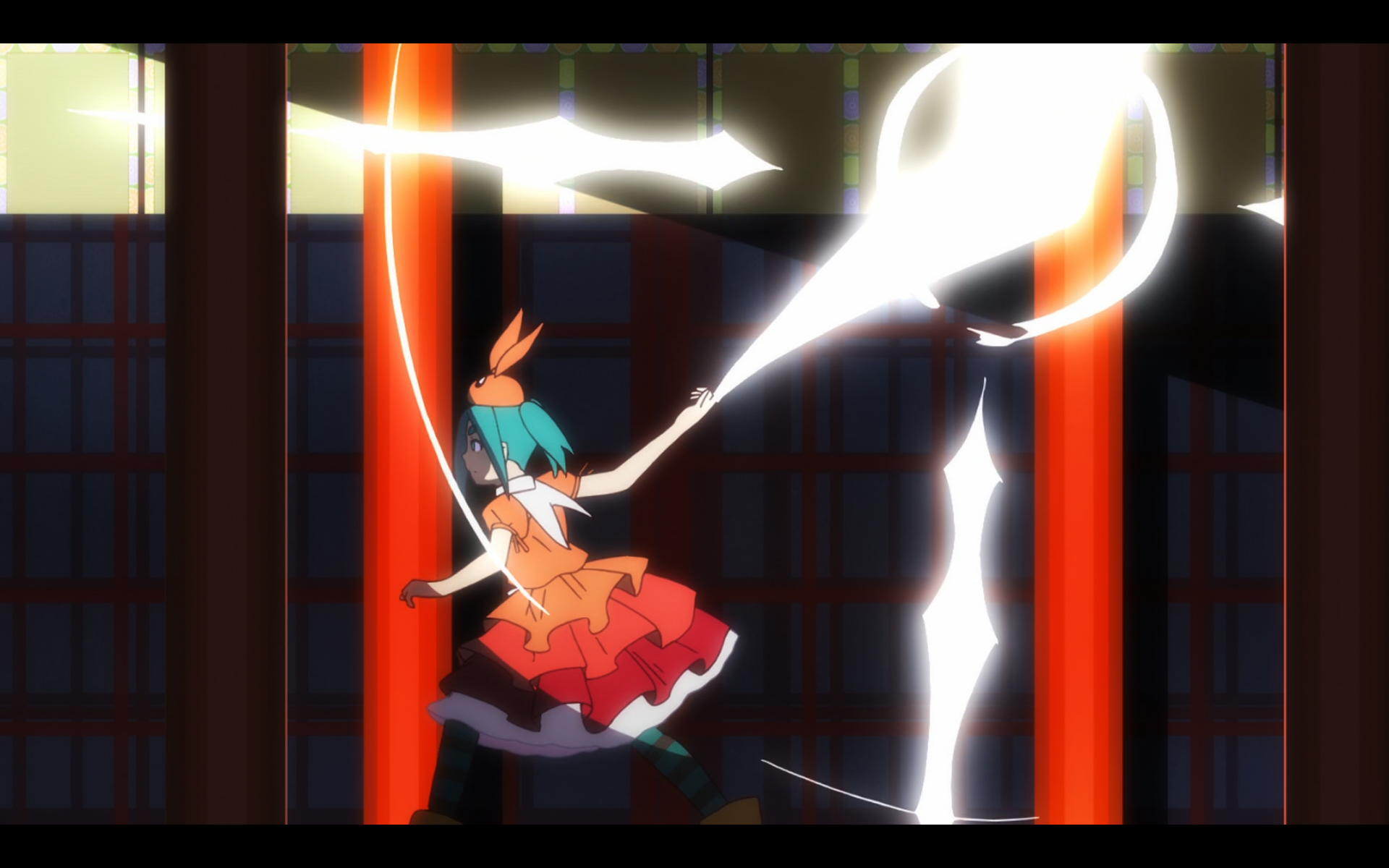
I really hate having to summarize this series. It's more than a single sentence. The style of the endless conversations holds their substance and most of their meaning. It is in the hard-fought insistence from Araragi on a peaceful solution for all, including the antagonist, that telegraphs his humanity will be proven. It's as certain as his ending up with Senjougahara to me. That unbelievably sudden attack of a monster is anathema to the slow mountain-climb of humanity-proving with only the observable for an arsenal; he may not know it when he feels it, but human nature is the revulsion-beyond-conscious reasoning that he feels watching Ononoki defy the plan and kill a man.
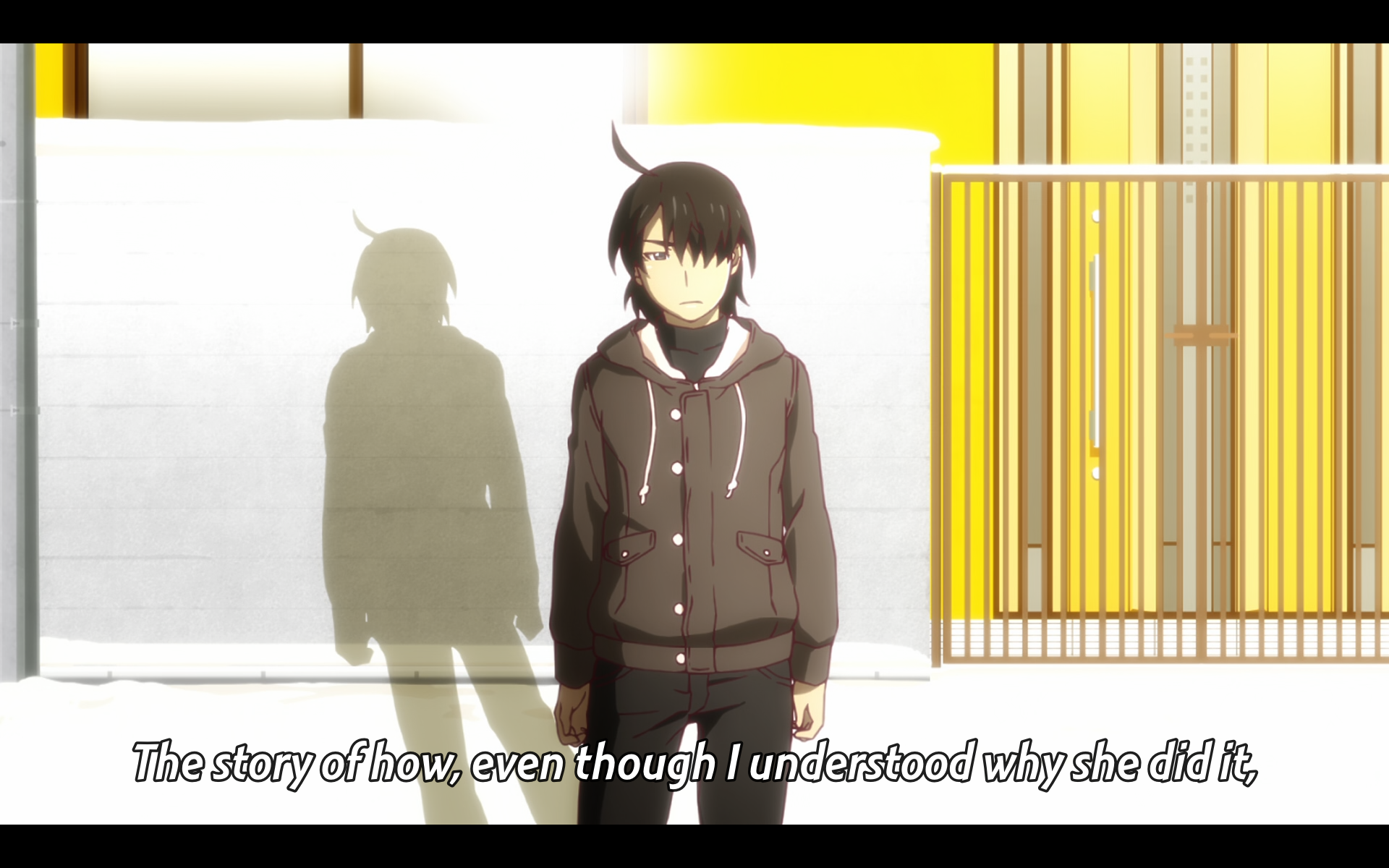
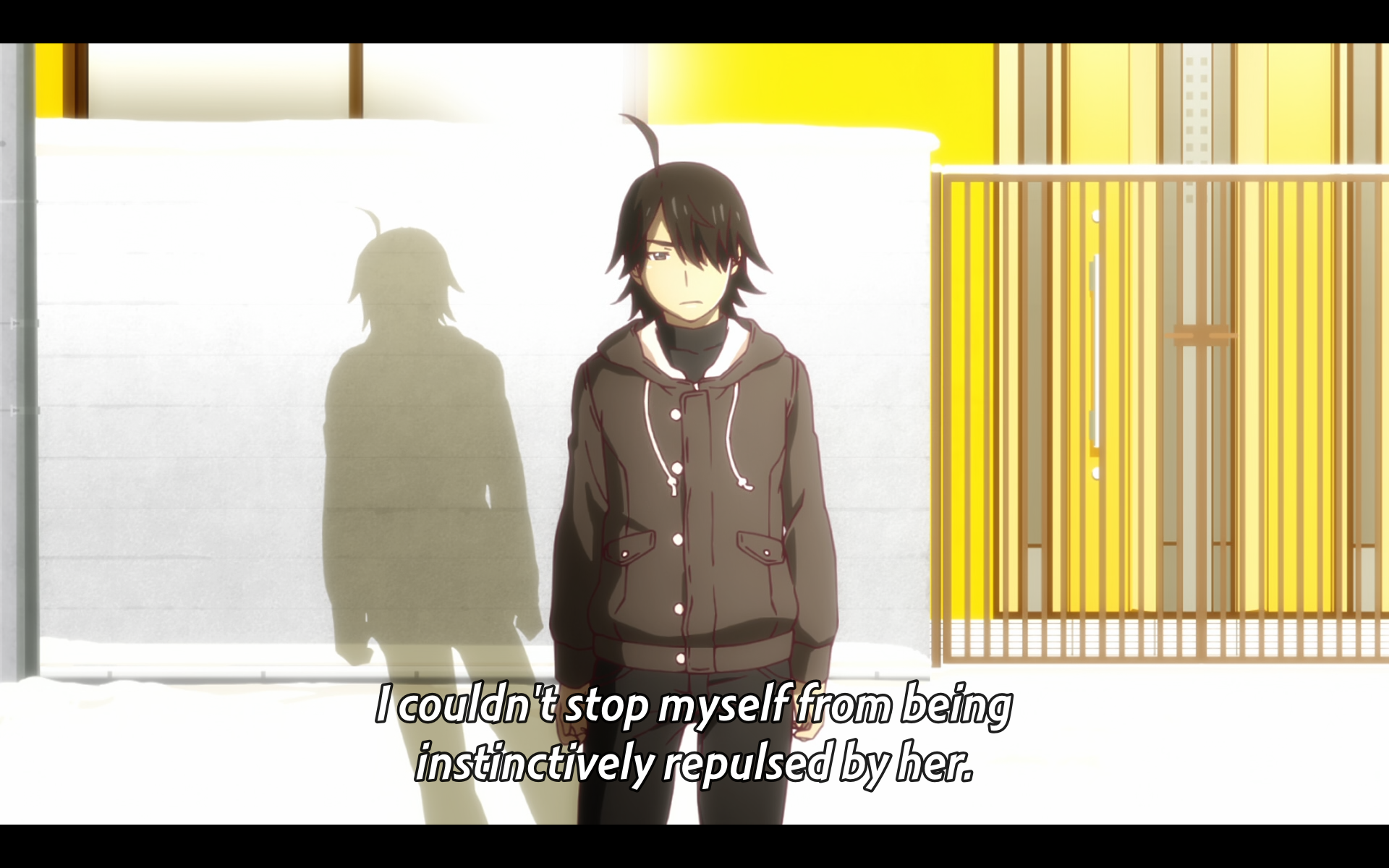
It's another moment of disillusion. The indulgence in flesh for a vampire keeping up appearances. The loss of reflection for a part-vampire who wanted to be human. The true nature of a monster doll. But unlike the vampire and part-vampire, the human-made oddity is trying to live among humans. She's not trying to be seen as repulsive at all. Tadatsuru asks, in his final moments, for Ononoki to recite her catchphrase which contains her valiant approach to humanity, and she obliges. She's an oddity made to be human, unlike Araragi, who was desolated; for her, that mountain-climb to be seen is a deadpan recitation.
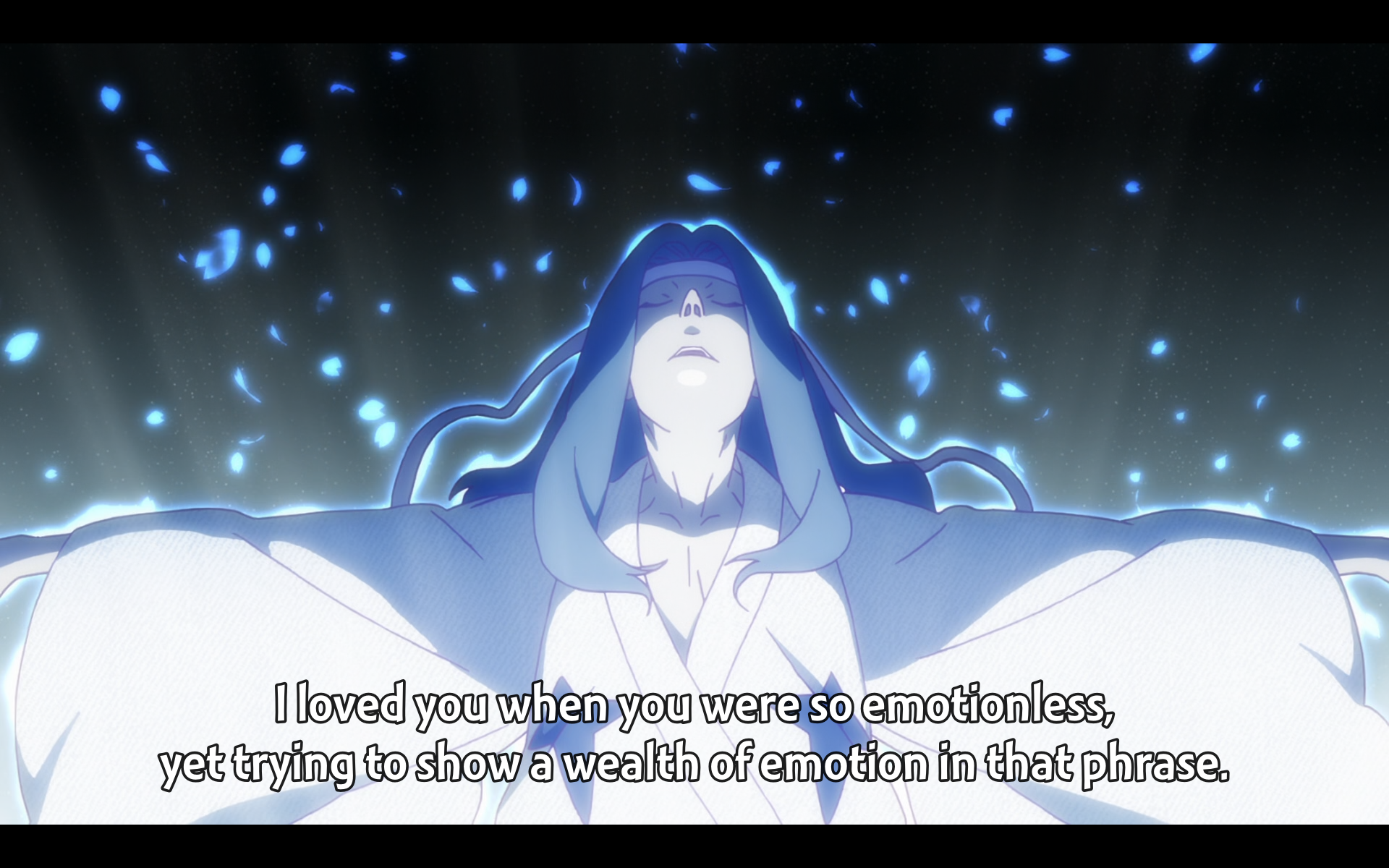
Even so it's only in the negative example ("Don't be like me") that she ultimately is able to–as a monster which still needs to be observed as odd–pass along a reminder of just how scarring it was to be a monster and to observe oddity as a monster. At once she pleads against and disproves monsterness as a monster. "I exist by using every trick in the book." Being both a humanlike friend and a negative example of monsterhood to be observed in completely different ways, presenting case after case for Aragagi rejecting Monsterness...
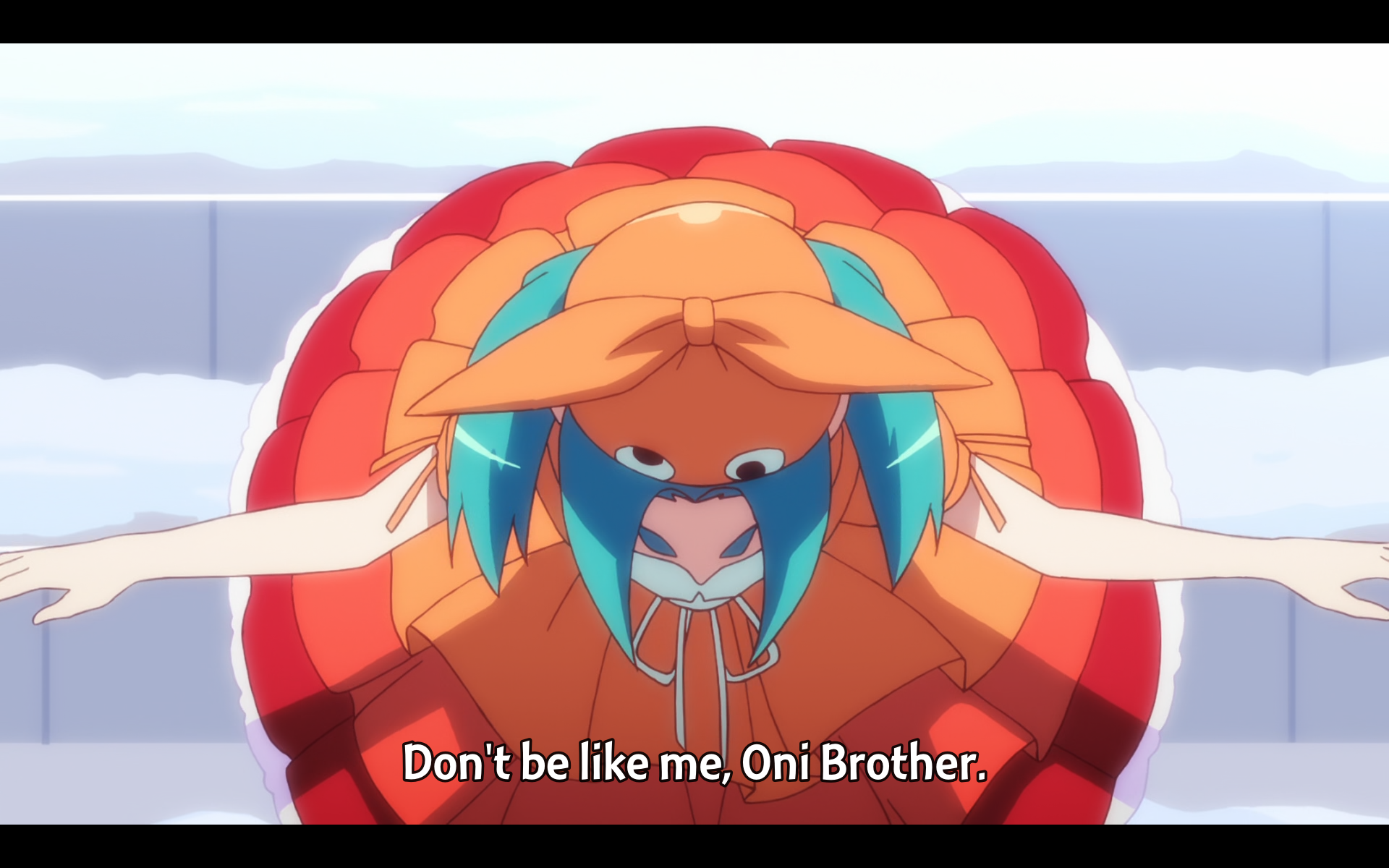
And then, at the end of the final episode of the arc, talking to him in the sun while he doesn't burn up... It feels almost cheap, right ? Unfair to the arc of the story to have this conflict resolved so simply. It's a graceful truth, and yes, it makes life positively unfair. Ononoki looks Araragi in the eye as it is proven he is not a monster, as he stands in the sun. She's proven right, that Araragi can live as a human; and its not because he is now, as he has been all this time. Unobserved by himself, having lost his fleeting sense of humanity, he feared he would burn up in the sunlight; this presupposition became the condition to which he was reintroduced to everyone, a vampire all arc long. But in the end, he can be observed as a human as he stands in the sun.
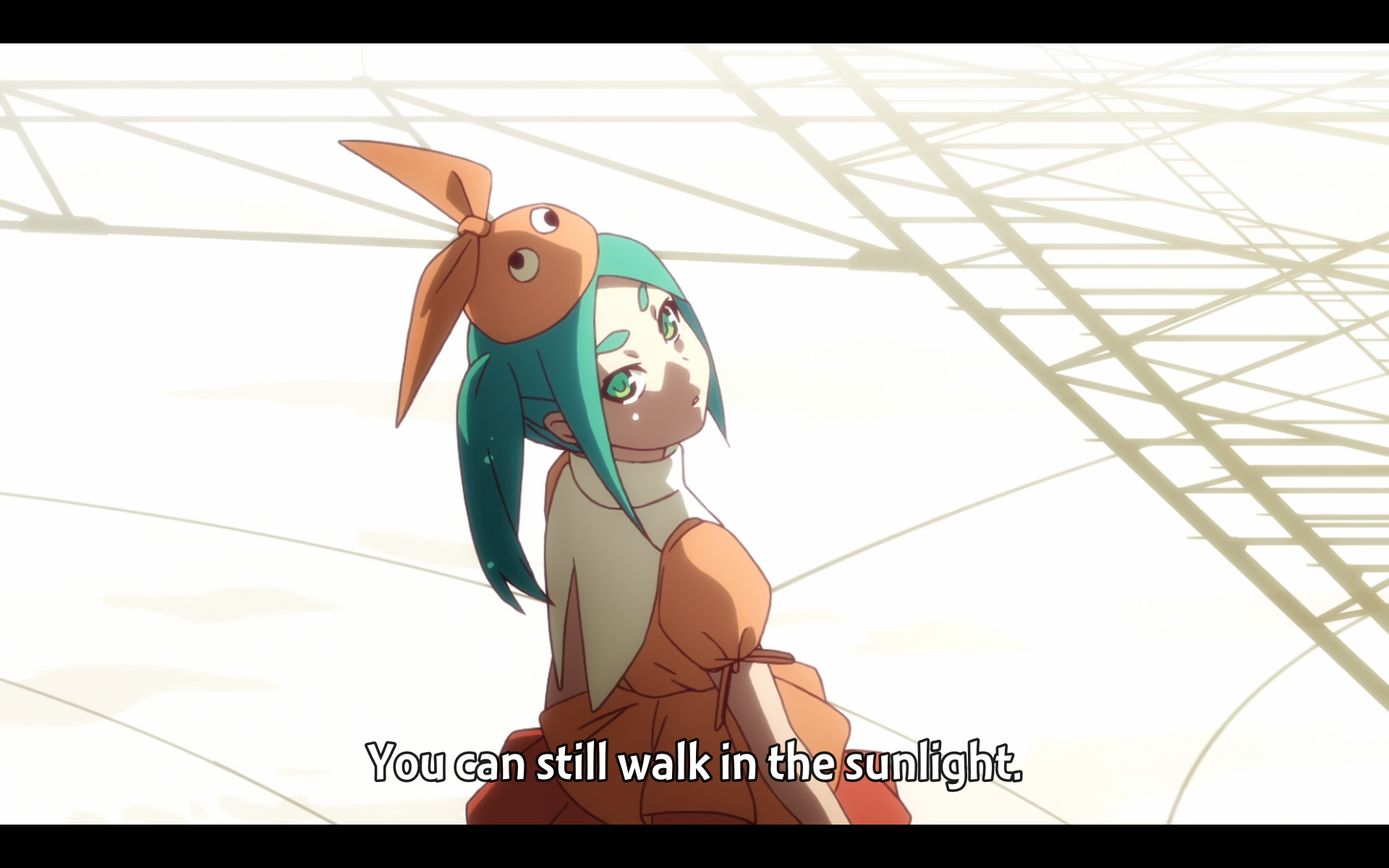
Without talking about a story I'll never tell anyone, I can't say how much that evidence of humanity means. I have to assume it means something similar to Araragi's instinctual and unconscious rejction of monsterhood: "I can't feel anything else (but human) if i tried." It's an awful form of relief, the tears pouring down my face as I write this. The monster bleeding out through clear water feels correct. Just realizing I can rationalize something easier and infinitely more frustrating as the correct course of action, trying to be my self instead of the kind of entity "that" can never happen to again– its a terrible relief. I don't know how to be an immortal vampire, or to be observed as having that same stature. I've been me before, and I loved it more than anything. It's impossible, remembering it, and so very daunting to realize again. But I will. I'm doing it now, and writing about it. Someday I will write about anything else. Until then, thank you very much for reading !